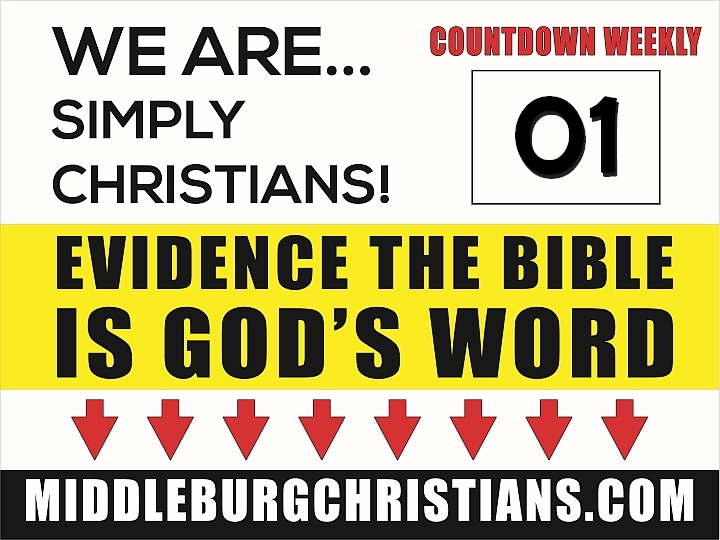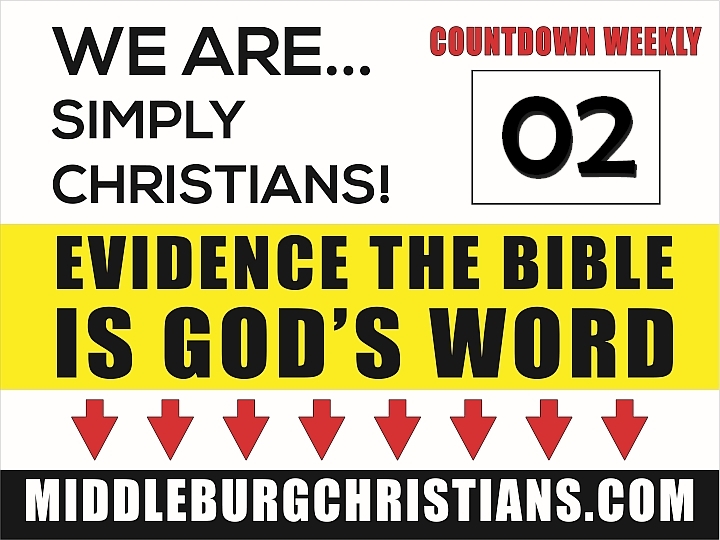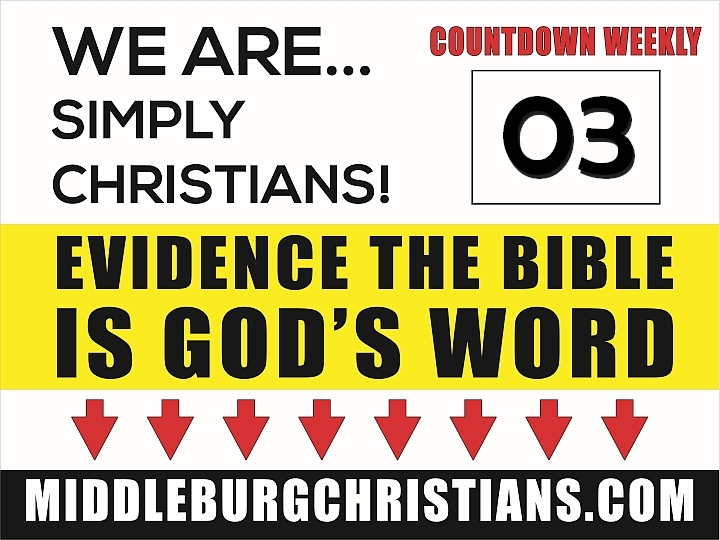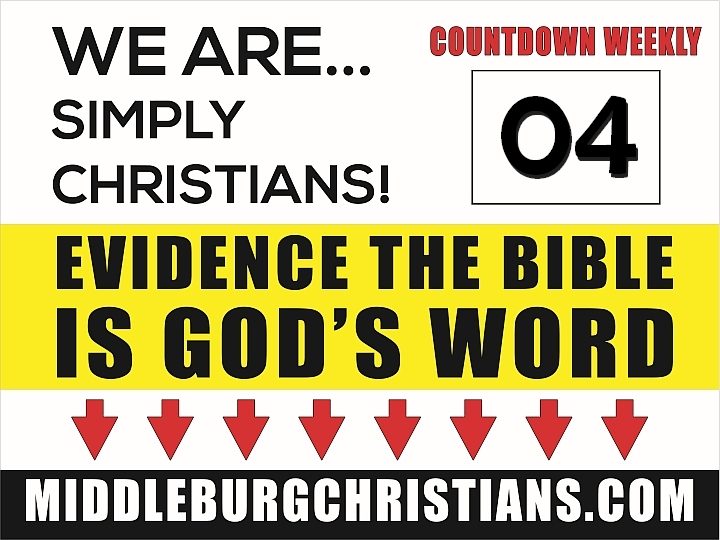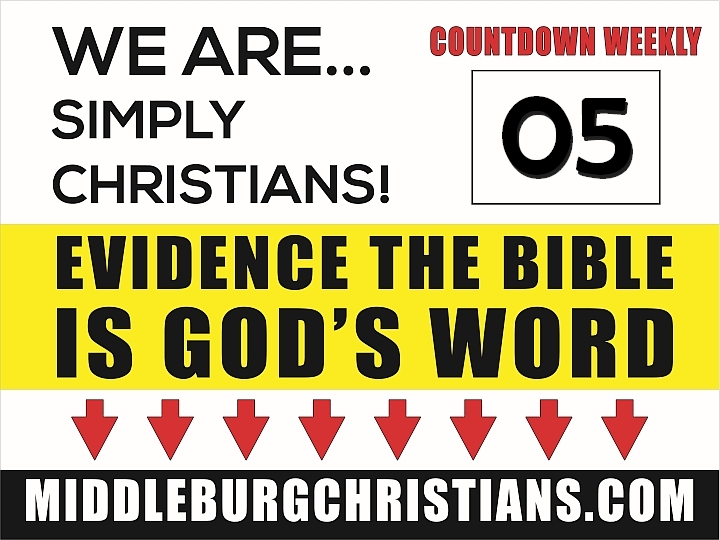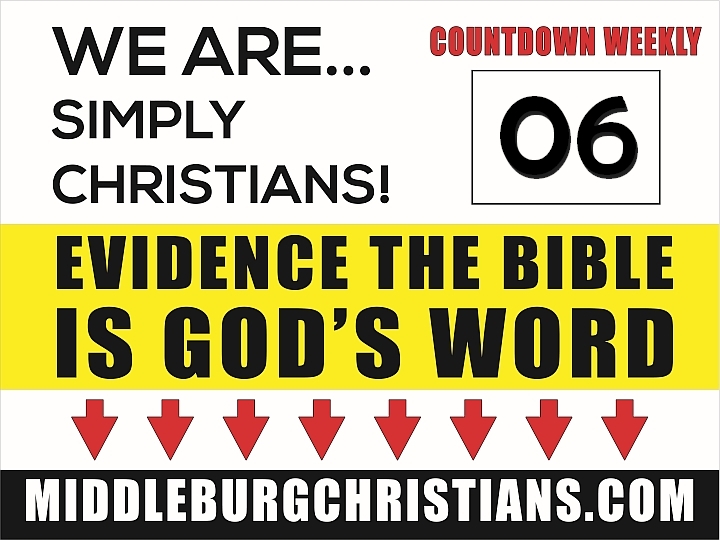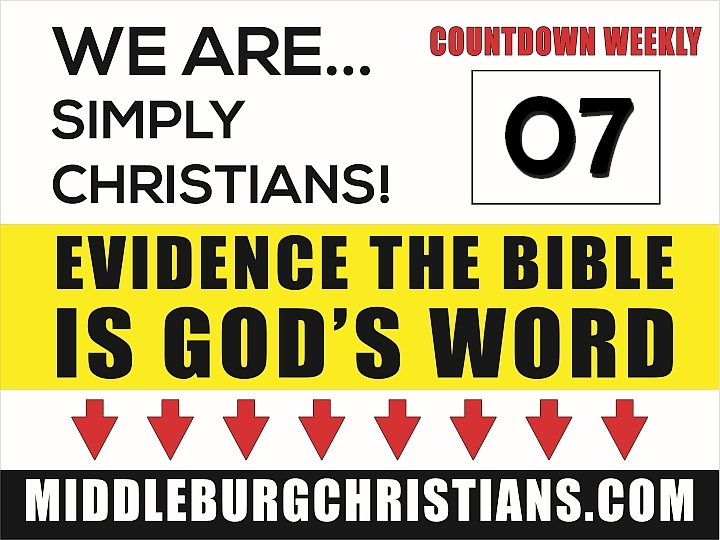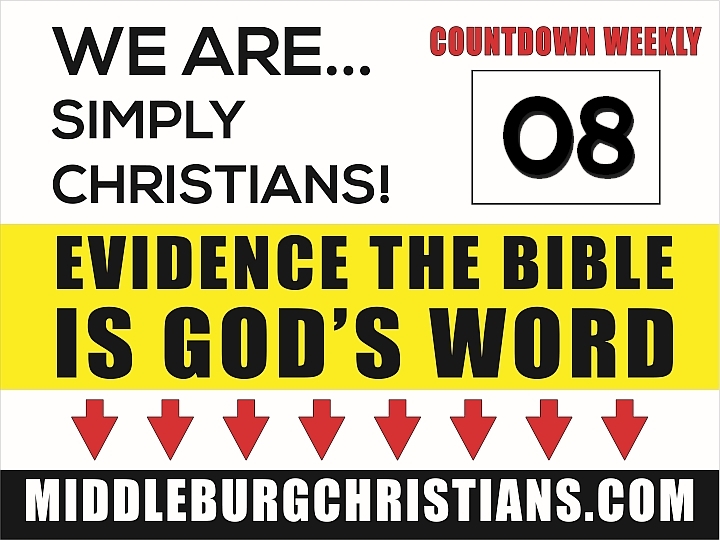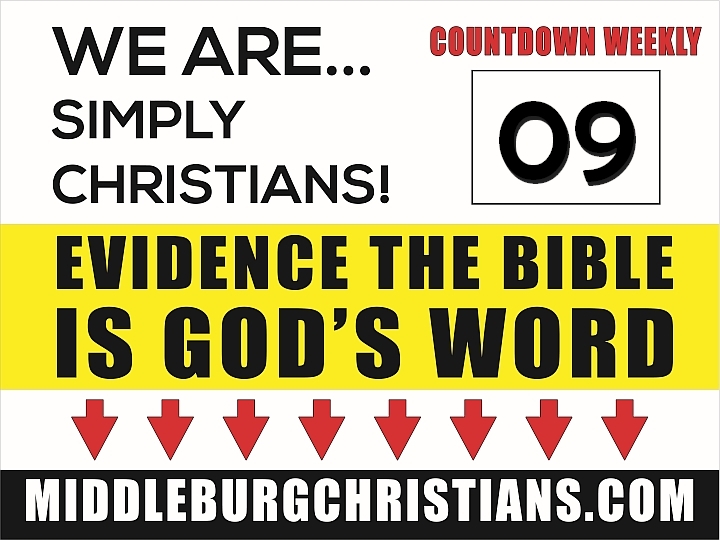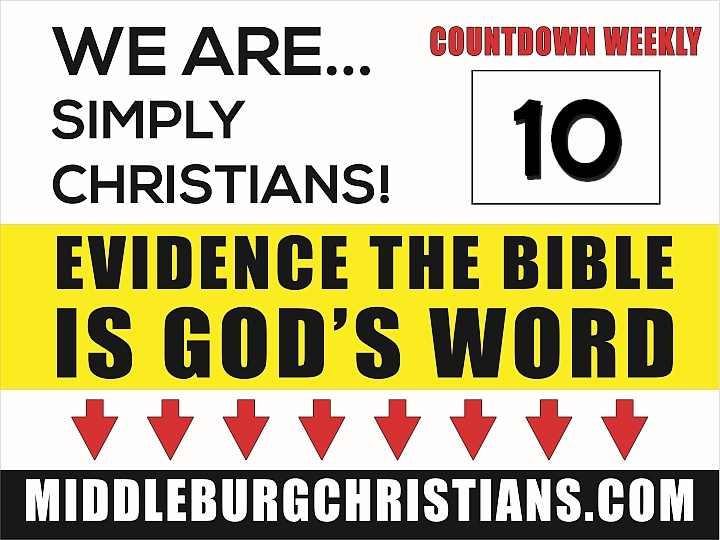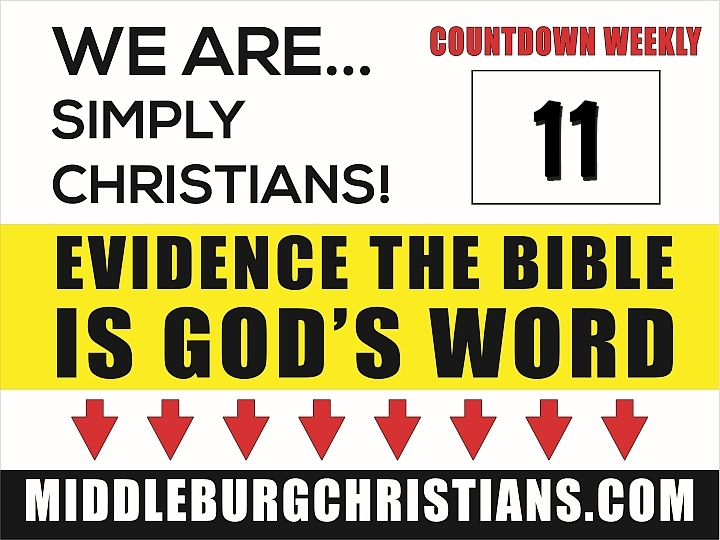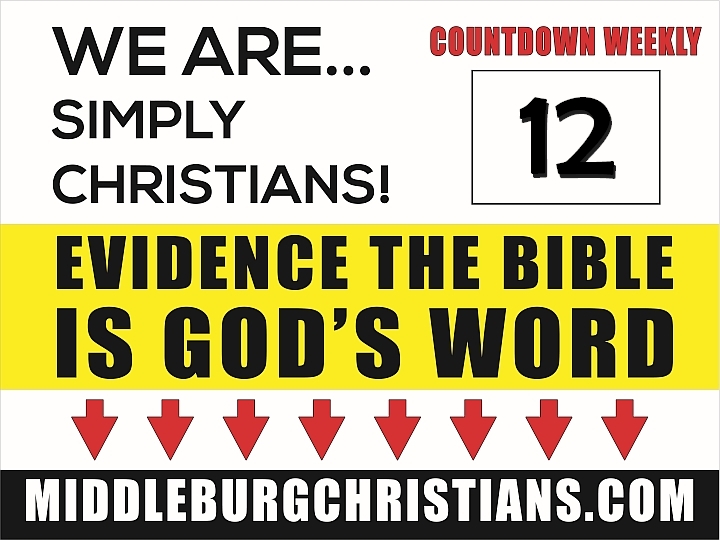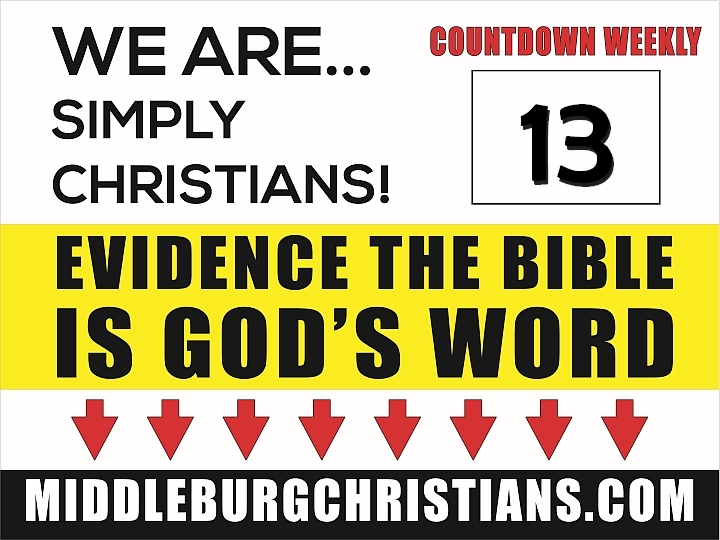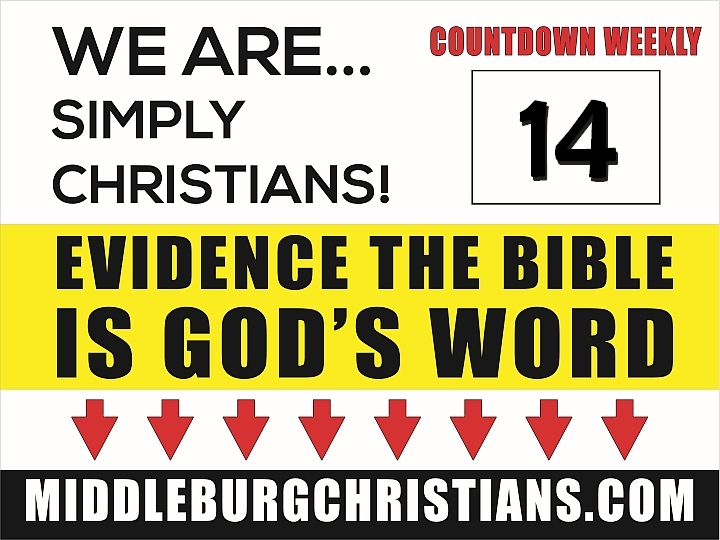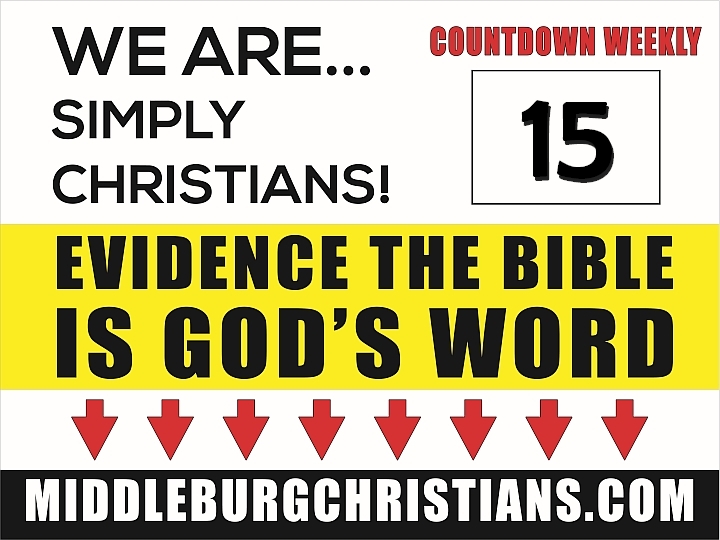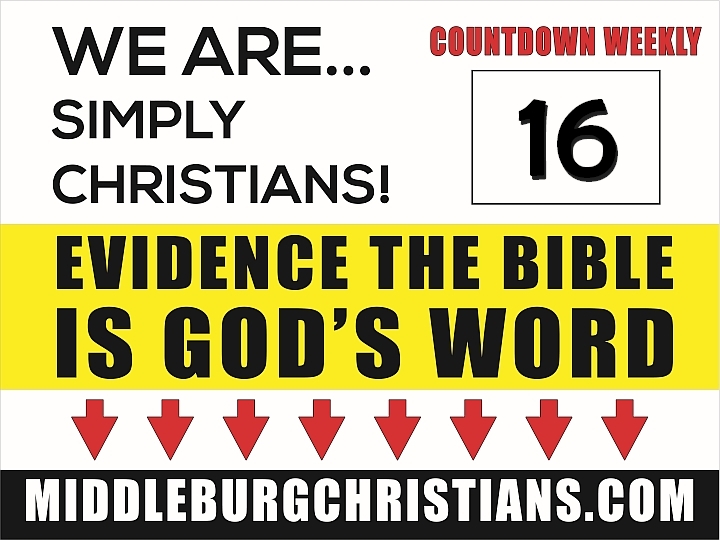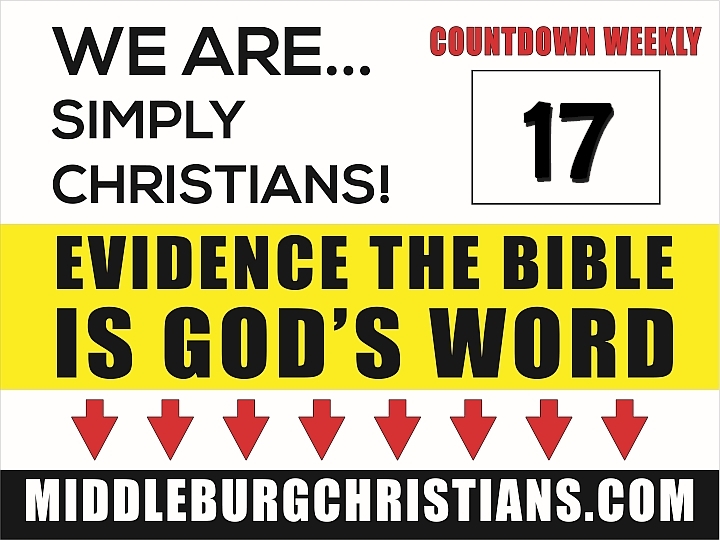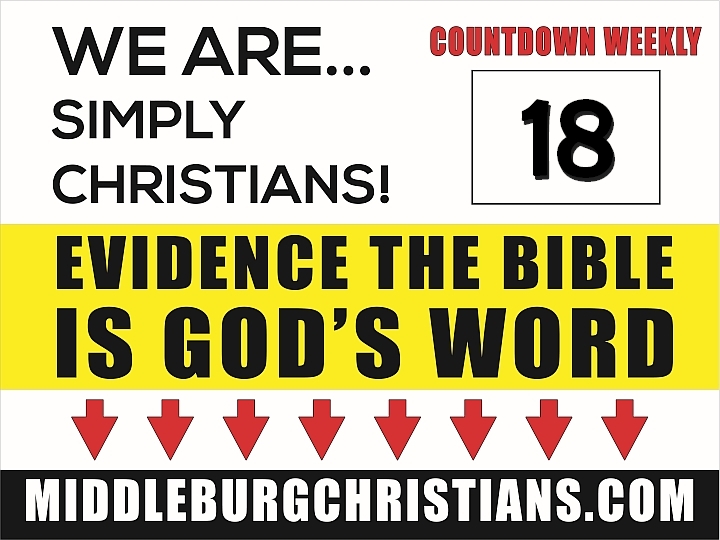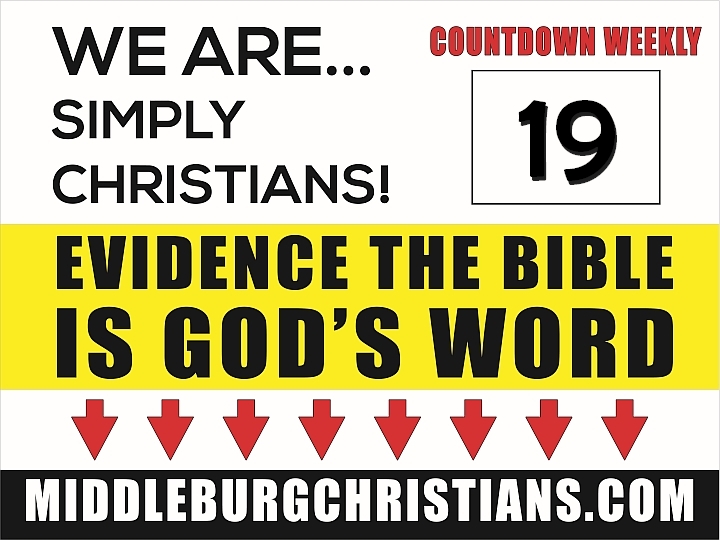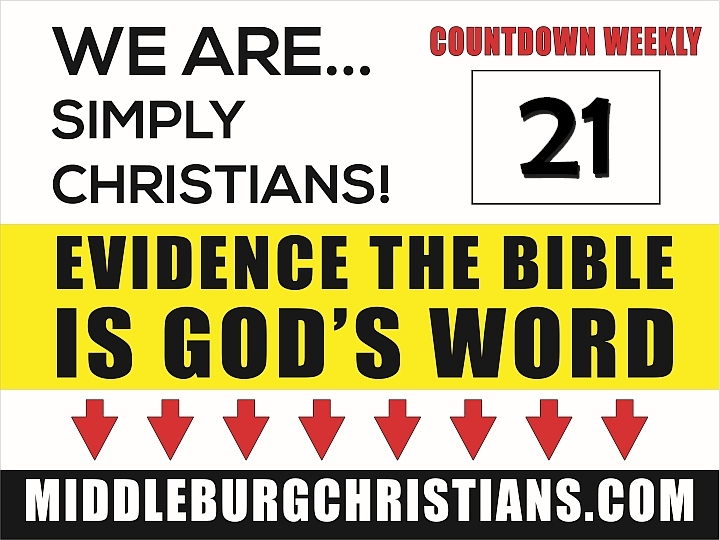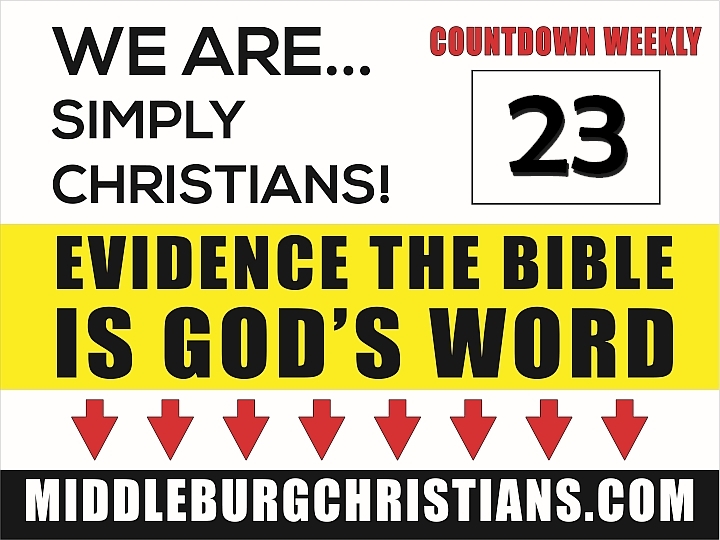Evidence the Bible Is God’s Word. 25 Reasons to Believe.
Click here to make a comment or leave us a message.
Reason #01
Who was Jesus: It can only be one of 3 options! (A lunatic? A liar? Or The Lord!)
Who is Jesus? The answer to this question is very important to billions of people (believers and non-believers alike). His influence can’t be compared with anyone else that has ever existed.
Believers say he is the Son of God. Others in the world say he was a prophet or just one of the great teachers. Those that don’t respect the Bible might even possibly tell you that he never existed. But, almost all historians would agree that there are some facts we can know about Jesus.
Most agree: that He went about teaching; that He died on a cross; that He was buried and yet His body went missing; and that His disciples shortly afterwards started claiming He had risen from the dead. They don’t necessarily believe that He DID rise from the dead but acknowledge that many CLAIMED it.
But who is Jesus? Have the apostles’ writings been corrupted since first written? Experts in historical manuscripts admit that the writings we have today are effectively the same that were written down by His disciples. So, we can look to the Bible to decide who Jesus was. What did He say about Himself?
C.S. Lewis (having been an agnostic for most of his life) became a very famous apologist (one who uses rational arguments to try to convince others of the truth of Jesus being THE LORD). As he investigated the Bible’s claims, he believed there were really only 3 possible answers to who Jesus was. He was either a liar who just wanted others to believe He was someone great; a lunatic that wasn’t the Son of God but believed that he was; OR He was exactly who He claimed to be – the Lord who was sent by God to save us and to be king forever.
Lewis came to realize that the idea that Jesus was just a good man who had some very important insights into life is nonsense. Jesus and His apostles didn’t leave any room for that kind of Jesus.
In the gospels, we find people at times trying to accuse him of being a lunatic (Jn 10:20-21) and yet He always provided rational arguments and proved all He claimed. The gospels also record that people accused him of being a liar (Jn 8:39-59) and likewise it was always in the context where He proves Himself. When Jesus declared a paralytic’s sins were forgiven, religious leaders effectively said “You lie!” (Blasphemy, only God can forgive) and yet He proved it by healing the man (Mat 9:2-7).
When Jesus speaks to Martha about whether she believes that He is “the resurrection and the life”, she tells Him that she does believe and He proves He is speaking the truth by raising her brother Lazarus from the dead (Jn 11:23-27, 38-45). Jesus tells His disciples that truly they would preach to their nation and be persecuted and that God would bring destruction on their city and temple within a generation (Mat 23:26-24:2); all of which happened within that generation -just as Jesus had said.
There are many other passages that show Jesus was claiming to be more than just a good man; and for anyone who is really seeking an honest answer, all one needs to do is to read a portion of the gospels and Jesus’ claims jump off the page. Even with all the evidence, the Jewish leaders handed him over to the Romans to be crucified. The charge over His head – ‘Jesus, king of the Jews’ bore the truth of who He is. God’s providence provided that His sacrifice would be publicly acknowledged; His claim of being God’s promised King (= the Christ) would be decided in just a few short days.
The prophet Isaiah had predicted that someone would come and die for sins and also that He would be without deceit (Isa 53:9). Isaiah had also predicted that this child that would be born as king and savior would be named “God with us” and be described as “Wonderful Counselor, Mighty God, Eternal Father and Prince of Peace (Isa 7:14; 9:6-7). The O.T. prophets did NOT describe the Messiah as just a man.
The apostles, very quickly after the tomb was empty, speak of His overcoming death and being seated at the right hand of God. They use language clearly speaking of Him being exactly who He said He was – the King sent by God; the Son of God (Heb 1:1-3, 8-13; Col 2:9; Jn 1:1,14; Jn 10:30).
It really comes down to the claim about His resurrection. If Jesus died and then rose on the 3rd day, then He must have been who He claimed to be. So much of any of what the N.T. writers claimed He said and did, depends on that one event. If He rose from the dead then everything He claimed must be believed. His resurrection is the only way to explain what happened in the first century. No other explanation fits, even though plenty have tried to explain it away.
Have you honestly considered who Jesus is? He is not just a good man (a good man can’t claim to be the Son of God if not true). He is not a liar (that would make just about everything He said a lie; that is pathological – that kind of lying always brings a loss of reality and saying absurd things that sooner or later become exposed). He is not a lunatic – lunatics have lost much of their reasoning ability and any who listen for more than a little while will recognize it; yet Jesus powerfully destroyed any rational argument made against His claims. What is left? Jesus is Lord and He has the authority to judge your life on Judgment Day.
Are you treating Jesus with the respect, love, honor and submission that He deserves? Judgment Day is coming. Jesus said so!
If you have any questions or would like to learn more about God’s word and the evidences it provides, please let us know. – Greg Whipple
___________________________________________________________________
Reason #02
How can anyone explain the apostle Paul’s conversion? (the only answer is that he saw the risen Jesus)
The man known as the apostle Paul (or Saul) has confounded some of the greatest doubters of Jesus. He obviously had a very rational mind as anybody who has read his writings will be forced to agree. He also knew the Scriptures well and was in a position to understand what Jesus’ disciples were claiming.
He was a very educated man who had been taught by Gamaliel, a highly respected rabbi known to history. If anyone could have discovered deception in the Christians’ claims (especially knowing he threatened, tortured and imprisoned) it would be Paul before he became a believer. Certainly if there were any inconsistencies in their message, evidences of lies in their claims or false motives, he would have found them. How could a man that was so convicted that the Christians were wrong change so dramatically?!
A few details in the N.T. are given of Paul’s life before his conversion that adds to the mystery of this great change. He described himself as living from his youth up as a Pharisee; how he was raised at the feet of Gamaliel; how he lived his life with a perfectly clear conscience; how he was advancing in Judaism beyond many of his countrymen – being more extremely zealous for his ancestral traditions and how he could publicly state that the Jews knew about his life [Act 22:3; 23:1; 26:4-5, 8-9; Gal 1:13-14].
Many details were then given of his strong opposition to the gospel: how he couldn’t believe that Jesus was raised; how he breathed threats and murders against believers; how he persecuted ‘the way’ to the death and punished them often and tried to get them to blaspheme; how he was enraged at them – even pursuing them to foreign cities to bind them and bring them back [Act 26:8-11; 9:1; 9:21; 22:4].
We then read of his conversion: how he was on his way to Damascus (with others) to destroy Christians; how a light shown around them and they fell to their knees and a voice spoke; how Paul tells us it was Jesus speaking to him from heaven and proving he was wrong and that he needed to start preaching the gospel – eventually even to the Gentiles; and how he was struck blind and 3 days later a disciple named Ananias gave him back his sight and baptized him [Act 9; 22; 26].
Paul’s dramatically changed life is a witness to the truth of his claims from that point onward! We read throughout Acts and Paul’s own writings: how immediately after seeing Jesus (within days!) he was in the synagogues of Damascus proclaiming that Jesus is the Son of God (in another passage Paul says: I didn’t prove disobedient to the heavenly vision but kept declaring…); that all the Christians were amazed at his radical change; how he was able to confound the Jews – proving Jesus was the Christ; how he was so effective that the Jews plotted to kill him; how he slipped away by being lowered in a basket; how his teaching didn’t come from men but directly from Jesus by revelation; how later he went to Jerusalem and boldly preached while again his life was threatened and so they sent him off to Tarsus; and then how later, many were hearing how “he who once persecuted us is now preaching (in Syria and Cilicia) the faith he tried to destroy” [Act 9:18-30; 22:17-21; 26:19-23; Gal 1:21-24].
From there we see him beginning a fuller ministry which we read about starting in Act 13. Never turning back, always boldly preaching the same message until finally he was put to death about 30 years later. Shortly before he died, we read that he said “whatever things were gain to me, I have counted as loss for the sake of Christ” [Phi 3:7].
How can you explain this life? A man who can claim he lived righteously and zealously as a Jew; a man who was respected and known by many of the Jewish leaders; a man who was so motivated to destroy the church that he had a reputation that brought fear upon the disciples; a man so determined to destroy the new teaching that he pursued Christians even to foreign cities after asking authority from the High Priest. How can anyone explain a man who so radically and quickly changed his thinking, actions and alliances within just a few days?!
It can’t be that Paul was just gullible or bitter – his amazing teachings and sacrificial life make any claim like this impossible to believe. The only answer that really makes sense is given to us by Paul himself. Luke records what Paul said about his ‘meeting’ with Jesus on the road to Damascus in Act 9,22, and 26; explaining exactly what had caused this change in him –VJesus appeared to him, proving He is the Christ.
Paul explained that it wasn’t just that one time that he saw Jesus, but that Jesus appeared to him several times over the coming years; how he had a vision of being caught up to the 3rd heaven; how Jesus provided direct revelation to Paul to teach; how he was called to be an apostle to witness to the truth that he now KNEW and how he had powers to prove he had been sent by Jesus [Act 22:17-18; Act 18:9-10; 2Co 12:1-7, 12; Gal 1:1-2, 6-12].
Paul’s converted life proves the truth of Jesus’ resurrection and exaltation as the King of kings. Are you following Him?
If you have any questions or would like to learn more about God’s word and the evidences it provides, please let us know. – Greg Whipple
___________________________________________________________________
Reason #03
The apostles very quickly and consistently claimed the resurrection (and its significance for us!)
LUKE TELLS US THAT WITHIN WEEKS OF JESUS’ CRUCIFIXION, THE APOSTLES WERE ALREADY DECLARING HIS RESURRECTION, HOW IT WAS CONNECTED WITH O.T. PROPHECIES, AND ITS SIGNIFICANCE FOR ALL OF US. THE APOSTLE PAUL WITHIN 20 YEARS WRITES 1CORINTHIANS AND CONFIRMS IT. THE RESURRECTION OF JESUS IS ONE OF THE BEST ATTESTED EVENTS OF ANCIENT HISTORY! WHY SHOULD ANYONE DOUBT IT?! DO YOU?
History tells us that within 35 years of Jesus’ crucifixion, there were ‘an immense multitude’ of disciples in the faraway city of Rome who were cruelly put to death simply for being His followers (Tacitus, a respected Roman historian mentioned this in about 100 AD). Other evidences outside the Bible help us to know that Christianity had spread rapidly throughout the ancient world. How can this be explained?
In the Bible, Paul writes to the church in Rome around 57 AD showing that there are already many Christians in the Empire’s capital and that the resurrection of Jesus was a focus of all Paul’s teachings. The Apostle Paul’s letters to many congregations prove that these churches had already existed within 20 years of Jesus’ crucifixion. Paul’s letters prove that the gospel had already spread to faraway lands; also proving that the main details of the gospel were being preached from the very beginning.
Paul reminds everyone that he was once a persecutor of Christians and had believed the gospel message to be blasphemy. He mentions that his message came directly from Jesus and that it was essentially the same gospel as had already been preached by the other apostles (Gal 1:6-12; 2:1-9). Luke, the writer of Acts, even speaks of the trials against Paul and how he was accused of ‘stirring up dissension among all the Jews throughout the world’ (Act 24:5), asserting that such well-known people as the High Priest, Felix, Festus and Agrippa II heard his claims (Act 24:1-3; 25:23-26; 26:1-23).
An example of Paul’s success can be seen in the city of Ephesus where his enemies were complaining that Paul’s teaching had succeeded in turning a considerable number of people from all over Asia away from the goddess Artemis to such an extent that they were afraid of losing their business of selling idols (Act 19:23-27). Other contributors to the New Testament also speak of Jesus’ resurrection and its blessings for the faithful (examples include: 1Pe 1:1-4; Jam 1:12, 5:7-9; 1Jn 2:1-2, 3:2, 5:11-13 ; Heb 1:1-3, 7:15-25).
The Bible has two books written by Luke ( ‘The Gospel According to Luke’ and ‘The Acts of the Apostles’) that speak of Jesus’ ministry and of how the gospel spread during those first decades. He mentions that eyewitnesses had already recorded the life and teachings of Jesus but that he also wanted to ‘investigate everything carefully’ so that others might know the ‘exact truth’ about what they had been taught (Luke 1:1-4). It’s important to note that not once did Luke have to correct anything that had already been taught.
‘Acts’ speaks of how the early church rapidly grew and spread. We read in Acts 2 that the message of Jesus’ resurrection and forgiveness of sins was already being preached from the first day and that prophecies of Scripture were offered to confirm what had happened. Only that it really happened explains how the resurrection could be preached and believed in the SAME city where Jesus had been crucified just 50 days earlier.
We also read that the Holy Spirit was bearing witness with the apostles through many miracles and powers (Act 1:4-5; 2:1-4; 2:33; 2:43; 4:33; 5:12 + Jn 15:26-27; Heb 2:1-4). These facts help explain how the gospel spread quickly among Jews who 1] had been told Jesus was a blasphemer; 2] being threatened to NOT follow His teachings; and 3] how Jews uncharacteristically were willing to listen to ‘uneducated Galileans’ rather than their Jewish leaders.
We can read of there being over 5000 men having been converted within a few months (Act 4:4) and how ‘the number of disciples continued to increase greatly in Jerusalem’ (Act 6:7). It’s very hard to explain the incredible success of the claim of Jesus rising from the dead and being the Messiah in the very city that rejected and killed him.
We can also read how Paul had powerfully persecuted Christians and yet unsuccessful in rejecting Jesus (Act 26:11). Throughout the book of Acts, we read of the apostles and many disciples continuing to preach the same gospel message and it spreading throughout the Roman Empire. The message was spreading so rapidly that it would have been impossible to make major changes to the message and have it be accepted.
Within a century, the apostles’ writings were spreading and being translated into many different languages, further making it impossible to claim that Jesus’ life had later been turned into legend (as many try to do to explain away the claims concerning Jesus). Paul reminds the Corinthian believers about the gospel he had preached to them earlier (within 20 years of Jesus’ crucifixion):
- 1 Corinthians 15:3-8 For I delivered to you as of first importance what I also received, that Christ died for our sins according to the Scriptures, and that He was buried, and that He was raised on the third day according to the Scriptures, and that He appeared to Cephas, then to the twelve. After that He appeared to more than five hundred brethren at one time, most of whom remain until now, but some have fallen asleep; then He appeared to James, then to all the apostles; 8 and last of all, as it were to one untimely born, He appeared to me also.
These words more than any show that from very early on the truth of the resurrection of Jesus was a part of their message. There is no record or any indication that ANY of the apostles or early witnesses ever altered their claims. We can be confident that Jesus was crucified and yet was raised from the dead on the 3rd day and that this victory can be a victory for us as well!
If you have any questions or would like to learn more about God’s word and the evidences it provides, please let us know. – Greg Whipple
___________________________________________________________________
Reason #04
The claim that Jesus’ body was stolen by His disciples doesn’t make sense (yet it was THE claim made by others to deny the resurrection).
Matthew wrote his gospel within 40 years of Jesus’ crucifixion. The last two chapters tell us that He was crucified and then unexpectedly His body ended up in the tomb of Joseph of Arimathea. It then says that the Jewish leaders were afraid that somehow His promise of rising from the dead after 3 days could create a following if the body ended up missing from the tomb. So they asked Pilate to have it sealed and guarded. An angel rolled away the stone on the 3rd day (Sunday just before dawn) and the guards shook for fear and became like dead men. Did they see Jesus rise? Did they check the tomb and see the body was missing?
Later… Matt 28:11-15… some of the guard came into the city and reported to the chief priests all that had happened. And when they had assembled with the elders and counseled together, they gave a large sum of money to the soldiers, and said, “You are to say, ‘His disciples came by night and stole Him away while we were asleep.’ And if this should come to the governor’s ears, we will win him over and keep you out of trouble.” And they took the money and did as they had been instructed; and this story was widely spread among the Jews, and is to this day.
This very last part is important. How could Matthew have said this if there was no such rumor? There had to be; it is still within the lifetime of many people that would have known of these events!
This rumor indirectly confirms many facts: that the empty tomb was of importance to many, even decades later; that strangely there WERE guards guarding a dead body; that the body was missing; and that if it was really true, then they wouldn’t have known HOW the body had gone missing or WHO took it since they were asleep!
Why would the guards need protection – they must have seen something amazing at the tomb that required a false story. If not, why would the leaders bribe them and put out such a dangerous rumor for the guards. The only reasonable answer to why it was guarded and sealed is the one given by Matthew – that the leaders were concerned about Jesus’ claim of rising from the dead (Mat 27:62-66).
How could a group of guards all be sleeping and allow the seal to be broken KNOWING the penalty is death for either! How could the disciples roll the stone and steal a dead body wrapped with 100 pounds of spices and hope to outrun the guards? How could anyone believe that confused, frightened men hatched such a risky plan? What would have been their reason for stealing the body? How does Matthew know details about an angel descending from heaven; rolling away the stone; sitting upon it; his appearance being like lightning; and that the guards shook for fear of him?
Matthew says that the guards reported ALL to the chief priests so the whole council knew what they claimed and KNEW the rumor was untrue. Matthew is either being a false witness against the leaders and the guards (not to mention God!) OR he is telling the truth.
Why were the guards NOT executed: either offense should have brought death but the Bible provides a very reasonable explanation – the guards had to be kept quiet about what they saw and only the leaders could protect them from Pilate. If the Jews really knew the body was stolen, they could have applied pressure and caused SOMEONE to break and reveal the location AND let the guards be killed.
If the body was stolen with the hopes of convincing people that Jesus rose, the gospel narrative would have to have been worked out in just a few days – otherwise too many contradictory claims would start appearing and yet there are none. If there was a plan to steal the body, why did the women go to the tomb on Sunday morning and why did Mary think that OTHERS had taken the body? How could they say so many people saw Jesus risen? How could the claim that Jesus rose be believed by so many 50 days later and yet Jesus was not there?!
How could Peter have tied together so many Old Testament prophecies in such a short period of time? How does Peter refer to an empty tomb in Jerusalem to prove Jesus fulfilled Psalm 16 if Jesus’ body was NOT missing from the tomb (Acts 2:29-32)? How is it possible to explain Paul’s conversion and teachings if He didn’t see the resurrected Lord?
How is it possible that not one of the persecuted apostles cracked if they were spreading lies? How is it possible they would continue to teach what they knew was false with so little to gain? Would it have been believable to Jews to hear that their leaders covered up the truth? Many examples can be seen of their corruption in the Bible and in secular history!
There is a big hole in history that only the resurrection perfectly fills and we have many writings witnessing to the resurrection within 40 years of the crucifixion of Jesus. Why should we believe any other explanation? Each alternate that man has tried to come up with has proven to be much less believable than what the Bible claims – Jesus rose from the dead on the 3rd day!
If you have any questions or would like to learn more about God’s word and the evidences it provides, please let us know. – Greg Whipple
___________________________________________________________________
Reason #05
Jesus even put all His credibility on the line: If He doesn’t rise on the 3rd day, then He is NOT who He claims to be!
We read in the gospel of Matthew that Jesus had a message He strongly desired men come to understand and follow. At the end of ‘the sermon on the mount’, Jesus concluded by saying “everyone who hears these words of Mine and acts upon them… and everyone who hears these words of Mine and DOESN’T act upon them…”; obviously Jesus believes that His message is vitally important to their future destiny. Jesus will spend several years bringing His message to the Jewish people. Please read Matthew 10-12 to see the context of all Jesus was claiming.
At the end of chapter 11, Jesus declared that He was able to provide rest to ANYONE who would come to Him and learn from Him. In chapter 12, the Jewish leaders are shown to be very critical of Him. In Mt 12:9-14 we see Jesus healing a man’s withered hand on the Sabbath and they want to destroy Him. We then read that Jesus casts out a demon and people respond by saying that perhaps He is the Son of David. The religious leaders respond by saying that He was only able to do it by Satan’s power.
Jesus points out the foolishness of their thinking. They then challenge Jesus to show them a sign. Jesus could have responded in many ways (perhaps saying “follow Me around for a few weeks and you will see that I am who I claim to be; you will see many signs”). He could have displayed His power in an infinite number of ways that would have humbled them on the spot. Obviously what the Jewish leaders believe about Him and His message will have a significant influence on whether the rest of the people are receptive to it. And yet, amazingly, Jesus seemingly tosses all of His efforts to the wind when He tells them that the only thing they need to consider is whether He rises from the dead on the 3rd day. Jesus understands the problem is hardness of hearts (and NOT a lack of evidence) so he tells them in essence: none of what I’ve done so far matters. If I don’t rise from the dead after 3 days, then they should not believe in Me.
How could someone who is a teacher and obviously seeking for others to accept His teaching do this?
These men are considered by most of the Jews as their spiritual leaders. If they reject Jesus then most of the people will be convinced when they say that Jesus is not who He claims to be. If they were to believe in Him, most of the rest of the people would likely be much more receptive to Him and His teachings. For Jesus to challenge them publicly like this is either crazy or it is incredible confidence. Once He makes this statement, within a week of His death, the religious leaders can powerfully prove that He was NOT a prophet of God and certainly NOT the Messiah.
Who would say such a thing?! How can anybody be confident that they are going to rise from the dead?! Only the Son of God could say something like this and act as if it is a given. Not only that, but it implies His death; how could He sound so casual about it?! He connects His resurrection with what happened to Jonah the prophet almost 800 years earlier.
Mat 12:38-41 …the scribes and Pharisees answered Him, saying, “Teacher, we want to see a sign from You.” But He answered and said to them, “An evil and adulterous generation craves for a sign; and yet no sign shall be given to it but the sign of Jonah the prophet; for just as Jonah was three days and three nights in the belly of the sea monster, so shall the Son of Man be three days and three nights in the heart of the earth. The men of Nineveh shall stand up with this generation at the judgment, and shall condemn it because they repented at the preaching of Jonah; and behold, something greater than Jonah is here.”
Notice how He rebukes these leaders as being evil. They would understand that Jonah had effectively been dead for 3 days but that God had providentially saved him (he went on to warn Nineveh of God’s anger towards their rebellion).
Jesus is claiming that the events 800 years earlier were really pointing to what would happen to Him. He also asserts that He is greater than Jonah and that they will be judged for their rejection of an even greater prophet and His warnings.
We also read in Luke 11:29-32 that Jesus said: as Jonah became a sign for the Ninevites, I will be a sign to this generation. What was this sign? It was that His message was preached AFTER having been effectively dead for 3 days. Matthew tell us that His claim was the reason they asked Pilate to have the tomb sealed and guarded (Mat 27:62-66)
Please read your Bible; faith comes from hearing and they are words of life that can set you free! If you have any questions or would like to learn more about God’s word and the evidences it provides, let us know. – Greg Whipple
___________________________________________________________________
Reason #06
Jesus spoke of His coming death and resurrection many times:
Jesus told the leaders that the ultimate sign of His being the Messiah was the resurrection (Mat 12:38-40). Many times throughout His ministry, we can read about Jesus declaring that He would die and rise from the dead. Sometimes he directly made the point and at other times it was said more subtly but we can understand that He was confident in His resurrection from the dead.
In the beginning of His ministry, the apostle John tells us that Jesus cleansed the temple and was asked for a sign, and His response was “Destroy this temple and in three days I will raise it up”. John tells us ‘when therefore He was raised from the dead, His disciples remembered that He said this’ (John 2:18-22).
In Mat 16:20-22 Jesus asks His disciples who they believe that He is and Peter responds that He is ‘the Christ, the Son of the living God’; Matthew then goes on to tell the readers that from that time on Jesus was telling His disciples that He must suffer, die and rise on the 3rd day. In Mat 17:9 Jesus tells His disciples to tell no one of His transfiguration until after ‘the Son of Man has risen from the dead.’
Jesus also tells His disciples that He has “authority to lay His life down and authority to take it up again” (John 10:17-18).
In a story Jesus relates (known as ‘Lazarus and the rich man’), He speaks of Abraham telling the rich man that “if they do not listen to Moses and the Prophets, neither will they be persuaded if someone rises from the dead” (Luk 16:31); which sounds suspiciously like what Jesus was about to do to provide even more proof of our needing to respect God.
In Mat 20:18-19 Jesus is approaching Jerusalem for the last time and prepares His disciples again for what is coming by saying “the Son of Man will delivered up…and crucified…and on the third day He will be raised up.”
In the last few days before He was arrested and then crucified, He tells His disciples that a woman pouring perfume on Him was preparing Him for His burial. The night before He died, He told His disciples that the cup He was asking them to drink was “My blood of the covenant, which is poured out for many for forgiveness of sins” and that He would “NOT drink of the fruit of the vine from now on UNTIL that day when I drink it new with you in My Father’s kingdom.” He then quotes Zechariah 13:7 saying that the shepherd would be struck down and the sheep would be scattered. And yet followed by saying “But after I have been raised, I will go before you into Galilee (Mat 26:2; 12; 28-29; 31-32).
As they were leaving to go to the mount of Olives, Jesus told His disciples that He was going to His Father’s house and that He would come again to receive them (John 14:2-3).
In John 16:16 Jesus says: “a little while and you will no longer behold Me; and again a little while and you will see Me.”
After Jesus was arrested, He tells the religious leaders that from now on He would be “seated at the right hand of power” which clearly speaks of His ascension – which is not possible without a victory over death (Mark 14:62).
After Jesus was crucified and buried, the religious leaders said to Pilate: “Sir, we remember that when He was still alive that deceiver said, ‘After three days I am to rise again.’” This is the reason for the tomb having been sealed and guarded! On the morning of His resurrection, the angel reminds the women that Jesus said He would rise from the dead and then meet His disciples in Galilee (Mk 16:5-7). And finally, after His resurrection, Jesus reminds His disciples that this is what He had been telling them.
Luke 24:44-48 Now He said to them, “These are My words which I spoke to
you while I was still with you, that all things which are written about Me in
the Law of Moses and the Prophets and the Psalms must be fulfilled.” Then
He opened their minds to understand the Scriptures, and He said to them,
“Thus it is written, that the Christ should suffer and rise again from the
dead the third day; and that repentance for forgiveness of sins should be
proclaimed in His name to all the nations, beginning from Jerusalem. You
are witnesses of these things.”
From all these passages, it is clear that the apostles had heard Jesus speak of His death and resurrection and yet they didn’t realize what He was saying until AFTER He rose from the dead. This last passage helps us to understand that it wasn’t just Jesus having said these things but that the Old Testament had provided prophecies that also spoke of His resurrection and the victory over sin and death that we can have if only we are willing to die to our selfish, prideful, ignorant and worldly self and live for Him by learning and following His teachings.
Are you willing to be His disciple? Matthew 28:18-20 describes what is known as the great commission in which Jesus told His apostles to go and make disciples of all the nations; baptizing them in the name of the Father and the Son and the Holy Spirit; teaching them to observe all that He commanded them. If you are willing to follow Jesus, you must be buried with Him in baptism so that you can walk in newness of life (Rom 6:3-4).
Why not open a Bible and begin reading the words that have proven to be from our Creator?! If you have any questions or would like to learn more about God’s word and the evidences it provides, let us know. – Greg Whipple
___________________________________________________________________
Reason #07
Jesus pointed out that there were many who bore witness to His claims: (John 5)
There are many people today that act as if everyone was very gullible in the past. When Jesus traveled around the Jewish land and made claims of him being sent by God; being the one who would save them as their king, most people DID NOT immediately accept what He said. It was only by providing many evidences that some began to believe. Also, we can see that many refused to believe even when presented with an abundance of evidence. All of this is not much different than today. We don’t want to believe whatever anyone claims. On the other hand, we don’t want to deny truth if there are good reasons to believe.
Jesus always offered reasons to believe His claims. In the gospel of John (chapter 5), it tells us that the Jewish leaders heard Jesus had healed a man who had been suffering for 38 years – their only response was to persecute Him. He challenges them by calling God “My Father”. They are even more offended and want to put Him to death because they understand that He was “making Himself equal with God.” Jesus continues to challenge them and lets them know that only through Him could they have life and that He would be the one to raise them up on the last day and judge them.
Very outrageous-sounding claims! But He then begins to explain how they can know that His claims were valid. He says that many others bear witness of Him as well; that He was NOT the only one making these claims. John the Baptist had born witness (Jn 1:29-34; 3:28-31); Jesus’ works bear witness (His teachings; His miracles; His wisdom; His compassion; His holiness); the Father bore witness (Mat 3:17 at Jesus’ baptism, the voice from the heavens said “this is My beloved Son, in whom I am well-pleased.”); the Scriptures bear witness of Me (by promising that the Messiah would come; that He would be godly; that He would fulfill many specific prophecies that Jesus was fulfilling); and Moses also wrote of Jesus (Deu 18:15-19 – how God would raise up a prophet like Moses from among Israel and how they must obey Him).
The Old Testament said in Deuteronomy 19:15 that there needed to be at least 2 credible witnesses to confirm a fact. If Jesus was falsely claiming that God had sent Him, then He deserved to die for His lies against God and for claiming any kind of equality with God. BUT, Jesus provided MANY witnesses that were confirming that His message was truly from God and therefore must be respected.
If you were asked to be on a jury for a trial and there were four very credible witnesses, you would have to acknowledge their claims. How much more when the witnesses were the ones that Jesus pointed to?! John the Baptist was respected by most of the people as a righteous prophet of God. No man had ever done the works Jesus had done (and would continue doing!); even the greatest prophets sent by God before Him! God had spoken at Mount Sinai to the nation of Israel but NOT in the positive and personal way that God spoke publicly about Jesus –God had NEVER described anyone as ‘His Beloved Son!’ Jesus also mentions the Scripture bearing witness of Him and later even makes comments that suggest that MUCH of Scripture was pointing to His life and purpose.
These are NOT ordinary witnesses; how can they be set aside?! They can’t. And finally He mentions Moses. The Jews had great pride in their Lawgiver. God had spoken to Him face to face and He was used by God to bring them out of bondage. And yet, even this great man was not without sin. He was unable to enter Canaan because of His sin at Meribah (he struck the rock when he was only supposed to speak to it –Num 20).
After Jesus made these claims of many witnesses (in John 5), there were even more witnesses to increase the confidence of anyone considering following Jesus. The apostles bore witness to His miracles and resurrection and the Holy Spirit bore witness as well by the outpouring on the day of Pentecost and through miracles preformed through the apostles and also others in the early church.
If you are not following Jesus, there is no excuse! The apostles tell us that we must believe the gospel message that is being preached (proven through many evidences) and that this must compel us to repent of our rebellion against God. We are then told to be baptized into Christ (dying to self and being joined to Him) so that we can receive the blessings of His sacrifice and be cleansed of our sins. Finally, as we come up out of the waters of baptism, we must live the rest of our lives humbly remembering our commitment to our Lord and striving to more and more be conformed to His image. God’s word teaches us that we must continue to follow Him either until death or until the day that He returns (Act 2:37-42; Act 8:34-39; Act 22:12-16; Rom 6:1-8; Heb 10:32-39).
Have you obeyed the gospel preached by Jesus and His apostles as recorded in the Bible? If not, what are you waiting for?! None of us know if we have tomorrow and each day we wait is another day that our hearts are being hardened by the deceitfulness of sin (Heb 3:13).
If you have any questions or would like to learn more about God’s word and the evidences it provides, please let us know. – Greg Whipple
___________________________________________________________________
Reason #08
Jesus made some amazing claims but proved them with even more amazing signs!
John (the apostle), in his gospel, recorded many claims made by Jesus that are known as the “I am” statements. Each one of these seem ludicrous for any man to say and yet Jesus declared them all and He provided powerful signs to prove them. There are many other claims Jesus made that have been recorded throughout the gospels, but these are especially powerful.
Either He was the Son of God and must be respected as the one with all authority OR He was not. If NOT, we should ignore Him and help others to reject his false claims.
John’s whole gospel focused on how Jesus pointed to His Deity. The very first verse of the gospel of John declares: “In the beginning was the word; the word was with God and the word was God.” Then in the 14th verse of the same chapter, John tells us that “the word became flesh and dwelt among us.” All throughout the gospel of John, he gives us reasons to believe that Jesus was who He claimed to be and how the Jews recognized the implications of some of what He was saying but didn’t want to accept them even though they had been given an abundance of evidence.
The apostle John is writing this gospel perhaps 40-60 years after Jesus was crucified and after the other gospels had already been written. He is writing to disciples who already know most of the major events of Jesus’ ministry but is adding many details that had not yet been written down and which help to especially point out Jesus’ claims to being deity. John records that after Jesus rose from the dead, His disciples were doubtful until personally seeing Him risen. Thomas is recorded as saying he needed to personally see Jesus in order to believe. Jesus tells him that many will believe and be blessed w/o seeing what they were able to see. How can that be? John tells us that we can believe through the things that he (and the others) had written regarding Jesus’ life and teachings (John 20:19-31).
The well-known “I am” statements include:
A] I am the bread of life (He can feed us spiritually so that we will have eternal life) Jn 6:35,47-51. → He proved it by feeding 1000’s with almost nothing Jn 6:5-14
B] I am the light of the world (He provides God’s wisdom that can remove the darkness in our hearts) Jn 8:12; 9:4-5; 1:9-10. → He proved it by healing a man born blind (many witnesses KNEW he had been born blind and that he could now see) Jn 9
C] I am the good shepherd who lays His life down for His sheep Jn 10:11-15; 24-30 (He protected us from the greatest enemy – our own flesh’s willingness to sin and the condemnation that comes with it). → He proved it by willingly going to the cross as a sacrifice for our sins.
Jn 21:15-19 is a conversation Jesus has with Peter AFTER He rose from the dead; proving everything He claimed is true. He tells Peter to ‘Feed My sheep.’ Jesus is saying that He is the shepherd who lay down His life for His sheep and that He wants Peter and the others to bring the lost sheep back to God and to be shepherds of HIS sheep.
D] I am the resurrection and the Life (Jesus is able to defeat even death for us and give us lasting, true life) Jn 11:20-27. → He proved it by raising Lazarus who had been dead for 4 days (Jn 11:32-45).
Jesus even seems to be declaring Himself to be God (Jehovah or Yahweh) when he refers to Himself as “I am”; as God spoke with Moses at the burning bush and said: “Say to son of Israel, I AM has sent me to you” (Jn 8:24,28,58; Exo 3:14)
He also said “I am the door ”; “I am the vine ”; “I am the way, the truth and the life no one comes to the Father except through Me.” Each of these are exclusive claims. He is claiming that no one else can do what He was sent by the Father to do.
Jn 6:53…unless you eat the flesh of the Son of Man and drink His blood, you have no life in yourselves
Jn 8:24 …unless you believe that “I am”, you shall die in your sins
Jn 10:25-28 …you are not of My sheep; My sheep hear My voice, and I know them and they follow Me; …I give eternal life to them
Jn 11:26 everyone who lives and believes in Me shall never die
Jn 15:1-6 apart from Me you can do nothing; if you don’t abide in Me, …you will be cast into the fire
How could anybody make such claims and then say that if you don’t believe them that you cannot have eternal life?! The only solution to explain why the apostles believed His extraordinary claims is the extraordinary evidences He provided them. Are you willing to honestly consider His claims and the evidence that proves they are trustworthy?
The Bible claims that Jesus is the only way to have forgiveness of sins and be blessed with eternal life. Follow Him! Please feel free to leave a message or contact us if you have any questions or would like to study the Bible. – Greg Whipple
___________________________________________________________________
Reason #09
John the Baptist had much to say about Jesus!
It was mentioned in previous articles that John’s and Jesus’ births were accompanied by many convincing proofs. As John began preaching in the wilderness and baptizing, he provided many details of who Jesus was and the specialness of His ministry.
His primary message was that the kingdom was at hand and that they needed to repent and be baptized (confessing their sins). The Jews believed that the Christ would be a physical king and therefore would need a physical army to deal with the Romans and others. They likely were a bit confused that it was their HEARTS that needed to be ready (and yet there was plenty in the Old Testament that would have pointed to this!).
What details do the Scriptures provide regarding what John revealed about Jesus? John declared:
A] that Jesus existed before John (even though John was 6 months older) Jn 1:15
B] that Jesus comes from heaven and is above all Jn 3:31
C] that Jesus must increase but he must decrease Jn 3:28; that he was unworthy to untie His sandals Lk 3:16
D] that John’s baptism would point to the special one God had promised (how the Holy Spirit would come upon Him) Jn 1:31-33
E] that his own ministry was a fulfillment of Scripture which said a messenger must come BEFORE the Christ Jn 1:23; Mt 3:3
F] that Jesus is the Son of God Jn 1:33; AND that Jesus is the Christ Jn 3:28
G] that the Father has given all things into Jesus’ hands Jn 3:35
H] that Jesus was going to judge the nation (baptize with Holy Spirit and with fire -separating the wheat from the chaff) Mt 3:11-12
I] that Jesus was the lamb of God who takes away the sins of the world (interesting that he included Gentiles!) Jn 1:29
So what happened? All of Judea and the surrounding districts were coming to John and confessing their sins and being baptized. Most of the people became convinced that John was a prophet. The Jews believed (simply because they were Jews) that they were automatically going to receive the blessings of God. John warned them that unless they were faithfully producing good fruit, that they would end up being rejected.
When Jesus came to be baptized, John understood how unworthy he was to baptize Him and yet Jesus told him that it was necessary. As He was baptized, the heavens were opened, the Spirit descended upon Him like a dove and a voice from heaven said “This is My Beloved Son , in whom I am well pleased.” This was now the beginning of Jesus’ brief ministry before His crucifixion.
Shortly after Jesus began, John was arrested, imprisoned and then beheaded. Later Jesus declared that John’s baptism was from heaven (Mt 21:23-32) and that he was the ‘Elijah’ that Malachi 4 said was coming (Mt 11:7-14). John pointed his disciples to Jesus. Jesus said that John had born witness to the truth of who Jesus was (Jn 5:31-34). John the apostle tells us the same as well as him having been ‘sent by God’ (Jn 1:6-8).
John’s teachings were so well known that Peter could say to the Gentiles at Cornelius’ house ‘you know about John’s baptism and Jesus…’ (Act 10:36-39). Paul could tell the Jews in far away Psidian Antioch that ‘John proclaimed a baptism of repentance to all Israel and that he kept saying that he, himself was not the one’ (Act 13: 23-25). And later, in distant areas, there were people who were still following John’s teachings. When they were taught the gospel, they were then baptized into Christ (Act 18:24-19:7).
Later the Jewish historian Josephus (about 90 AD), mentions Herod Antipas was defeated in a battle and how it was believed by many Jews that God had brought judgment against him for killing the righteous man named John who came baptizing people (details of Antipas’ killing of John are found in Mat 14. It’s amazing that we have someone who was not a Christian confirming many details about John: how he was righteous; how he commanded the Jews to turn from sin and obey God; and how he baptized and therefore was known as ‘the Baptist’; how Herod Antipas feared him and so imprisoned and then killed him [Ant. of Jews 17:5:1-2].
John the Baptist had said much about Jesus and many people started believing in Him because of John’s testimony (Jn 10:41-42). It’s interesting to note (from the lettered list above) that John in the very first months of Jesus’ ministry had made most of the major claims of who Jesus was. There was no long period of time where a legend developed surrounding Jesus.
It’s also interesting that John 10 mentioned that John the Baptist performed no signs. If the Bible was so quick to talk about the miracles of Jesus and His apostles, why not claim that the one that was bearing witness of Him also had performed many signs?! Again, the only reasonable answer is that the Bible is simply declaring the truth of what happened; that John was a prophet and accurately described who Jesus was but that he didn’t do any miraculous acts himself. God has provided us yet another powerful reason to believe!
If you investigate the evidence, you will listen to John and Jesus and be baptized! What is stopping you? Please feel free to leave a message or contact us if you have any questions or would like to study the Bible. – Greg Whipple
___________________________________________________________________
Reason #10
So Many Evidences Surround Jesus’ Birth to Prove He Was Sent By God!
Jesus’ life, teachings and resurrection powerfully prove He is all that He claimed to be. But before He was even old enough to speak, God provided many evidences that would point people to Him. The Old Testament was full of prophecies that promised a King, salvation, blessings and much more. This promised one would be a human being (Gen 3:15 said He would be a descendant of Eve; Gen 22:18 promised it would be through Abraham’s family; 2Sa 7:12-13 assured king David that He would come from his family).
Isa 7:14 said that someone would come who would be born of a virgin and described as Immanuel (God with us). Isa 9:6-7 said that a child would be born who would sit on David’s throne forever and would be called Mighty God among other amazing names.
Micah 4:9-10 tells us that Jerusalem would be without a king for a while and then Micah 5:2-3 tells us that this child that would be born would come from Bethlehem and become the ruler God promised. Did Jesus’ birth come with special signs? Wouldn’t it make sense for God to give evidences at Jesus’ birth that He was special?
As we read the introduction to the gospels of Matthew and Luke, we read many details surrounding the birth of Jesus.
Mary was told by the angel Gabriel that she would have a son, w/o having relations, who would save His people from their sins, sit on the throne of David and be called ‘the Son of the Most High’ (Luk 1:26-38). Elizabeth (John’s mother) was able to know Mary was pregnant -even though she was only a month pregnant; that an angel had spoken with her; and she declared that Mary was carrying a boy who was her ‘Lord’ (Luk 1:39-45). After John’s birth, his father prophesied that God had raised up a ‘horn of salvation from the house of David’ as the prophets had promised and that his own son would be the one to prepare the way for the Lord (Luk 1:67-79). These events were more private, but the four righteous people Zacharias, Elizabeth, Joseph and Mary would all have been made aware that God was ready to fulfill His promises through their sons.
When Mary’s time came to give birth, God spoke to shepherds in the field and told them they would find a baby in a manger who is the savior and king and it tells us that they were telling others about what they heard and saw (Luk 2:8-20). When it came time to make the appropriate sacrifice at the temple, we are told that both Simeon and Anna who were righteous people started declaring that God was now fulfilling His promise to bring salvation and His Christ (Luk 2:25-38). After this, some Magi from far away, came with expensive gifts and publicly declared that they knew the king of the Jews had been born. They asked the leaders if they knew WHERE he would be born and they said it was prophesied to be in Bethlehem -quoting Mic 5:2. They then were led (by a ‘star’) to a house in Bethlehem and worshipped Jesus. Certainly everyone would have known about this event and would have been talking about it.
Shortly after this visit, King Herod whose personality was very paranoid against anyone who might be a threat to his power, ordered all the baby boys in the area of Bethlehem to be killed. Again, this would have been something that ALL the people in that area would remember for a very long time. Not much happened for approximately the next 30 years until John and Jesus began to publicly preach. But the Jews had been waiting for God’s promises to be fulfilled and so many amazing events had surrounded the birth of John and Jesus that people would very likely be keeping an eye on them (Luke 1:66 says ‘what then will this child turn out to be’ –concerning John).
Many of these details were very public: Zacharias’ prophesying; the shepherds; Simeon and Anna; the Magi; the killing of the babies. Most of these people were described as very faithful and so their testimony should have been considered trustworthy. These passages also reveal that there were many others who believed that God had promised to send a king (the Christ).
One obvious example of this awareness can be found when the Magi (wise men) came to Jerusalem and asked ‘Where is He who was born King of the Jews? For we saw His star in the east, and have come to worship Him.’ Notice that the Jewish leaders and Herod all understood that the prophets had been saying God would send a king, the only question was where He would be born. How could so many details be described by Matthew and Luke if none of it was true? There were too many claimed witnesses if it were just a fabrication. God was providing multiple, trustworthy witnesses of the salvation that would come very shortly.
When John the Baptist and Jesus began their ministries, there was already so much history to back up their claims that anyone honestly seeking would be able to know that these men were sent by God. We must respect what they said. John said Jesus was the one sent by God and Jesus told us how to have salvation and blessings through Him.
Do you believe the Bible or are you letting the world’s rebellion create doubts in your thinking? If there is sufficient evidence to believe the Bible’s claims, is it affecting your life sufficiently?!
Please feel free to leave a message or contact us if you have any questions or would like to study the Bible. – Greg Whipple
___________________________________________________________________
Reason #11
Before John the Baptist even began his ministry and witnessed that Jesus was the promised King, God had already provided many evidences that John would point the way:
Throughout the Old Testament, God had been declaring His plans to send someone from the family of David to bring great blessings to not only the Jewish nation but also the world. They were also predicting that this person would be a righteous king forever; bringing salvation to mankind. These same prophets also spoke of someone who would come BEFORE Him -preparing the way.
Isaiah predicted many details regarding the future king and also spoke about someone who would come before Him. Isaiah 40:1-11 states in part that God was going to greatly comfort His people; that a voice would call out in the wilderness ‘Clear the way for the LORD’ so that ‘the glory of the LORD will be revealed.’ Malachi 3-4 says ‘I am going to send My messenger and he will clear the way before Me. The Lord you seek will suddenly come to His temple; But who can endure the day of His Coming?’ and ‘I am going to send you Elijah the prophet before the coming of the great and terrible day of the LORD.’ These passages explain why Jesus later said: ‘if I alone bear witness of Myself, My testimony is not true …John also bears witness of Me (Jn 5:31-33).’ + Mat 11:8-15; 21:23-27,32
God didn’t simply send John as a fulfillment of those prophecies, but gave signs to the nation that it was time and that a baby to be born would be the one. In Luke 1, it tells us of a righteous, older couple that had been unable to have children. The man, Zacharias, is a faithful priest. While offering incense in the holy place of the temple, an angel tells him that his wife Elizabeth will have a son and uses the language of Malachi 4 to describe that he will be a prophet to turn the people back to God. He also said that he would go before the Messiah which refers to Malachi 3:1. Evidences include: his barren, elderly wife would soon be pregnant; it would be a son; the child would be filled with the Holy Spirit from his mother’s womb; Zacharias was seeing and hearing an angel tell him these things and was struck mute until the baby was born and circumcised.
The details surrounding his conception and birth were witnessed by many. In Luke 1:10 it mentions that a ‘whole multitude of people’ were in prayer outside the temple while he went in to offer incense. In Luke 1:21-22 it tells us that when Zacharias was taking too much time (after delaying he then came out unable to speak) that they then realized that he had seen a vision. This would have gotten everyone talking!
Then, in her 6th month of pregnancy, Elizabeth gets a visit from her relative Mary (who is now pregnant with Jesus). Amazingly, the baby leapt in her womb when Mary came and Elizabeth was inspired to say: ‘Blessed among women are you, and blessed is the fruit of your womb! And how is it that the mother of my Lord should come to me? For behold, when the sound of your greeting reached my ears, the baby leaped in my womb for joy. And blessed is she who believed that there would be a fulfillment of what had been spoken to her by the Lord.’
How is it that Elizabeth knew her relative was pregnant? According to the account, Mary was only about 1 month pregnant and no one would have suspected a faithful young virgin of being pregnant. And yet, the moment Mary entered, we are told that Elizabeth not only understood that she was pregnant, but that the child she was carrying was her ‘Lord.’ Again, if these were the only details, we might suspect that someone just made this up. But, the Bible provides so many evidences that we should have confidence that all these details can be trusted.
She then hears Mary tell her that God is ‘giving help to Israel as promised to Abraham.’ Then, when John is being circumcised and named on the 8th day, Zacharias speaks! Many were present at this moment when he was inspired by the Holy Spirit to say that ‘God has visited us and brought redemption by raising up a king from David as predicted by the prophets and fulfilling what was promised to the patriarchs.’ This must have confused those listening – because his son was NOT from the line of David. But he also spoke of how HIS baby boy (John) would be a prophet who would go on “before the LORD to prepare His ways” – quoting Malachi 3 and connecting this baby with God preparing the way for the One anointed to be King. In Luke 1:65-66 it tells us that fear came on all living around them; and it was talked about in all the hill country of Judea; all who heard those words kept them in mind saying ‘what then will this child turn out to be?’
Luke, who wrote these details, assures us that he investigated everything carefully and was writing down the exact truth of the events. Luke has proven trustworthy (Luke 1:1-4). So, when John started living in the wilderness and then later began preaching that the kingdom was at hand, much had already occurred to prove that God was using John in a special way and that his message should be respected.
If you have any questions or would like to learn more about God’s word and the evidences it provides, let us know. – Greg Whipple
___________________________________________________________________
Reason #12
The Prophet Zechariah powerfully spoke of the coming King (Zec 3 and 6):
As God fulfilled His promise to bring the Jews back from their captivity, God sent a few prophets to the remnant that was now back in the land. Haggai and Zechariah are the two from this time that God preserved in writing. As with most of the prophets, a good percentage of what they spoke about was concerning the future king that God would send.
In Zechariah chapter 3, we read that the high priest of the time (Jeshua) was clothed with filthy garments and Satan was accusing him before God. His filthy garments were removed and it was declared that that meant his iniquities had been taken away. How could his sins be removed? This was a mystery. A bit further in the chapter, Zechariah tells him that he represented “My servant the Branch.” It also says that “God would remove iniquity of that land in one day.” We can understand that it wasn’t Jeshua alone that would have his sins removed. But a day in the future would come when this would be accomplished and there would be peace and security (as we read that “every one will invite his neighbor to sit under his vine…”).
In Zechariah chapter 6:9-15, we read that the leaders were told to make a crown and set it on the head of Jeshua the High Priest. Zechariah then tells them that Jeshua represents “the Branch” who would come in the future. He would build God’s temple; this must have been a great mystery to them since they were almost finished rebuilding the temple that had been destroyed. Why talk about a future ‘building’?!
This passage also describes this future “Branch” as both a priest and a king. Another great mystery! The Jews understood that only a descendant of David could be the king while only a descendant of Aaron could be a priest. As far as the Jews were aware, it was impossible for one man to be both and yet that is what this prophecy is saying. It also describes how “those who are far off will come and build the temple of the LORD.” It can’t be talking about the Jews returning from captivity since they had already returned and were already rebuilding.
How were these prophecies finally fulfilled? When Jesus came, He set aside the Old Covenant that God had made at Mt. Sinai with the nation of Israel (through His sacrifice on the cross); establishing a new covenant which had a new priesthood. Jesus was now the new High Priest and demonstrated it by sacrificing Himself for our sins. Psalm 110 predicted that the king that God would send would also be a ‘Priest on the order of Melchizedek.’ The New Testament book of Hebrews ties together many of these thoughts and tells us that just as Melchizedek, who was described in Genesis 14 as a priest of God Most High, was also king of Salem; so Jesus also was king and priest like Melchizedek (Heb 7-10).
We are told that the ‘King Melchizedek of Salem’ translated means ‘king of righteousness and peace’ which certainly fits the description of Jesus. Another amazing thing about these prophecies is how details tie in with so many other prophets. A few examples include: My servant (like Isa 53); the Branch (like Isa 11:1; Jer 23:5); and in that day there would be peace/prosperity …sit under fig… (like Mic 4); Even the name of the man chosen to represent the future KING/PRIEST is important. His name was Jeshua, son of Jehozadak. If you translate those names, it is ‘Jesus, son of Righteous Jehovah.’ Could this just be a coincidence? How do you have a man who lived over 500 years before Jesus being so closely connected to someone who would be declared ‘the Son of God’?!
The whole N.T. says that Jesus’ greatest purpose was to be a sacrifice for sins. The Jews did not really understand this point before Jesus came. How does chapter 3 of Zechariah say that ‘the iniquity of that land would be removed in one day?’ This was pointing to the most important aspect of Jesus’ ministry. A few other passages of the O.T. (like Isaiah 53) spoke of God’s Servant coming and ‘bearing the sins of many’.
There is much more in the book of Zechariah that describes details regarding Jesus’ ministry and His victory on the cross. As one final example, in chapter 13:1 he predicted that “in that day a fountain will be opened for the house of David and for the inhabitants of Jerusalem for sin and for impurity.” This was said right after saying that “they would look on Me whom they have pierced (Zec 12:9-10).” Another detail that perfectly matches Jesus’ crucifixion!
The overwhelming number of varied prophecies and foreshadowing are impossible to explain away!
If you don’t believe the evidence is really there, what are your reasons for not believing?!
Have you really taken the time to investigate? If the Bible is speaking truth, nothing in life is more important to investigate.
And most importantly, what is your response to the warnings of blessings and curses made by Jesus?
If you would like other ‘Reasons to Believe’ feel free to let me know. – Greg Whipple
___________________________________________________________________
Reason #13
Daniel (chapter 9) predicted the Jews would return and rebuild Jerusalem and the temple but that it would be destroyed after the Messiah came and was ‘cut off’ (at end of ‘70 weeks’).
In Daniel 2, God declared that there would be 4 kingdoms to rise and fall before God’s kingdom would be established forever.
The Jews didn’t understand that this would be a spiritual kingdom –unlike anything that had come before. Daniel was in captivity after Jerusalem and the temple had been destroyed and had been prophesying all throughout the Babylonian Empire and into the beginning of the Persian Empire. In Daniel chapter 9, Daniel is remembering God’s promise of returning the Jewish people to their own land after 70 years (Jer 29:10-11). Now that the 70 years are almost past, Daniel prays to God that his people might finally return to their land and rebuild Jerusalem and its temple. While praying, God sends an angel to Daniel and declares the following:
“Seventy weeks have been decreed for your people and your holy city, to finish the transgression, to make an end of sin, to make atonement for iniquity, to bring in everlasting righteousness, to seal up vision and prophecy, and to anoint the most holy place. So you are to know and discern that from the issuing of a decree to restore and rebuild Jerusalem until Messiah the Prince there will be seven weeks and sixty-two weeks; it will be built again, with plaza and moat, even in times of distress. Then after the sixty-two weeks, the Messiah will be cut off and have nothing, and the people of the prince who is to come will destroy the city and the sanctuary…” (Daniel 9:24-27)
Since Daniel was praying for HIS people and that the ruins of Jerusalem and its temple might be rebuilt, this prophecy obviously is addressing his request. God is telling him that all that He promised would indeed be fulfilled BUT that this new city and temple would NOT last forever. He is told that there would be 70 ‘weeks’ until the city would again be destroyed. This ‘week’ could be interpreted as each consisting of 7 years so that there would be exactly 490 years; OR it could be interpreted as a figurative approximation of about 500 years (using the figurative phrase of 70 x 7 as Jesus did in Mat 18:22).
If you try to use it literally, you have to deal with the fact that the first decree to return was in 539 BC (Cyrus’ decree as mentioned in Reason # 90) and the temple was destroyed in 70 AD which ends up being 609 years. If you try to use some secondary decree, you still have a problem of trying to fit Jesus’ birth, death and the destruction of Jerusalem all in ‘one week’ which would be just 7 years. If it is meant only to be approximate, along with the fact that they were now under the 4th empire, they should know that the fulfillment of Daniel 9 was close. After 69 weeks (7 + 62) the Messiah would come but be cut off and have nothing; and only after this happened would some unnamed ‘people of the prince who is to come’ destroy the rebuilt city and temple.
There was a 1st century Jewish historian named Josephus that said: “Daniel also wrote concerning the Roman government – that our country should be made desolate by them” (Ant. 10:276). He believed that Daniel had predicted that they were sent by God to bring about the destruction of the Jerusalem and its temple in 70 AD. The only place Daniel spoke of this destruction was here in Daniel 9. Knowing the city of Jerusalem was destroyed in 70 AD and knowing Daniel 9 predicted that the Messiah must first come and be cut off, the Jewish Messiah must have already come! What an amazing prediction! The city and temple WOULD be rebuilt; it would be destroyed in the last ‘week’ of the ’70 weeks’ and yet NOT before the Messiah would come and be cut off (=Jesus was crucified 40 years before the desolation predicted by Daniel).

If you would like other ‘Reasons to Believe’ feel free to let me know. – Greg Whipple
___________________________________________________________________
Reason #14
Daniel (chapter 2) predicted the rise and fall of 4 earthly kingdoms before the everlasting kingdom of God’s Son.
Daniel was taken into captivity (while very young) when Babylon destroyed his nation. He prophesied over the next 70 years and continually proved to foreign leaders that even though they had great power, the God in heaven was ultimately in control. He prepared the Jewish nation for the fact that even though God had promised them a Messiah, many things must happen before His king would be sent.
Daniel chapter 2 describes a dream given by God to the powerful emperor of Babylon named Nebuchadnezzar. He saw an awesome statue made up of 4 parts and then a stone made without hands hitting it in the feet; destroying it completely. The stone then grew into a great mountain that filled the earth. This dream so powerfully affected the king that he greatly desired to know its meaning but distrusted his advisors to know how to interpret it. He told them that to make sure that he could trust their answer, he was demanding that they not only tell him the interpretation but the dream also! They all said “impossible!” The king was ready to destroy them all.
Daniel however was different; he told the king that the dream was from the God in heaven who could make known to Daniel the dream and its interpretation. Daniel precisely described the king’s dream (after telling him exactly what he was thinking before he fell asleep and the details of his dream – he now had the king’s full attention!) and then explained that the 4 parts represented 4 kingdoms that would rise and fall; one after another.
During the days of the 4th empire, God would set up His kingdom which would overpower the 4 kingdoms and endure forever. God was declaring to the world that He is in control and that no matter what happened, He would fulfill His promise of establishing HIS kingdom with HIS king. Men often forget that God is in control; especially men of great power. Daniel explained that the statue represented the Babylonians (the head of gold); a second empire which would follow (the chest of silver) – later understood to be the Medo-Persians; a third (thighs of bronze) – later understood to be the Greeks; and a 4th empire (legs and feet of iron and clay) – later understood to be the Roman Empire. Nebuchadnezzar acknowledged the greatness of Daniel’s God; he also gave Daniel a very prominent position in his kingdom.
God had promised His people a kingdom but would not send it for many centuries. God made sure they could trust that even though there would be much hardship and suffering, these dreams should remind them that God had not left them and that He was still in control! They should have remembered the centuries as slaves in Egypt and how God had given them freedom as promised! The majority of the Jews were very desperately clinging to the hope that God would finally bring His Messiah and end their suffering. Of course, most people often find ways to compromise to protect themselves. They were NOT eagerly waiting for God’s promised Kingdom since they had much of what they wanted in this life already – especially those in positions of leadership, power and wealth.
When John the Baptist came declaring that the kingdom of God was at hand, and then Jesus declared the same, this should have been a sign to the people that all God had prophesied concerning the coming of His kingdom was now very soon to be a reality. And yet, just as was predicted in Psalm 2, the nation rejected their king and crucified Him. But God made Him king of kings, exalting Him to His right hand, and providing a victory over the even greater enemies of Satan, sin and death.
Only when we respectfully submit to Jesus as our king can we hope to receive His merciful gift of salvation (from God’s wrath) and eternal life with Him in heaven. What will you do with the words of Jesus? Will you follow Him? Are you willing to lose your life to find it? Mk 8:34-38
– Greg Whipple
___________________________________________________________________
Reason #15
Isaiah predicted God’s ‘Anointed One’ would bring good news and comfort (Isa 61)
Again as we look at the prophet Isaiah, we recognize many sections that are pointing over 700 years into the future and describing both Jesus and the kingdom He established after His resurrection and ascension to the right hand of God. This lesson is focused on Isa 61:1-3 which is quoted by Jesus Himself.
“The Spirit of the Lord God is upon me, Because the LORD has
anointed me to bring good news to the afflicted; He has sent me
to bind up the brokenhearted, to proclaim liberty to captives, and
freedom to prisoners; to proclaim the favorable year of the LORD,
and the day of vengeance of our God; to comfort all who mourn,
to grant those who mourn in Zion, giving them a garland instead
of ashes, the oil of gladness instead of mourning, the mantle of
praise instead of a spirit of fainting. So they will be called oaks of
righteousness, the planting of the LORD, that He may be glorified.”
Notice some of the details: It is very interesting that Isaiah is saying ‘me’ and yet it is not Isaiah speaking but the Messiah speaking through Him. The Spirit would be upon Him (we see this when Jesus was baptized –Mat 3:13-17); the LORD has anointed me (Jesus is the Anointed One=Messiah=Christ!); to bring good news (‘good news’ is the same as ‘gospel’ Luk 2:10; Act 8:12; Act 13:32); proclaiming freedom (Rom 8:2 and Gal 5:1); proclaiming the favorable year of the LORD (Isa 49:8); and comforting all who mourn (Isa 40:1-2; 49:13; 52:9; Mat 5:4; 2Co 1:3-7).
Soon after Jesus began his ministry, He came back to where He grew up – the town of Nazareth in the area known as Galilee. It says he went into the synagogue on the Sabbath (Saturdays were the days that Jews would go to worship God at their local gathering).
Luke 4:16-21 records this event. It tells us that He was allowed to read from Scripture and that He read part of the passage above. It tells us that after He finished reading, He sat down and everyone’s eyes were fixed on Him. He then declares to all of them “Today this Scripture has been fulfilled in your hearing.” Imagine being there every Sabbath and hearing these sacred writings passed down for hundreds of years. Each generation hoping and praying that their oppression by so many other nations (and now the Romans) might finally come to an end – that God would finally send His promised Messiah. Imagine it has been well over 1000 years since God had begun to make those promises.
Now imagine a neighbor tells you that all those great promises found in the Bible are NOW being fulfilled AND that they were all about Him -very hard to accept! If you read a little further in Luke 4, it tells us that the people of His town were ready to throw Him off a cliff but that He just passed through their midst and continued on to other cities; preaching the good news of God’s promised kingdom. Why would the Bible include passages saying that people didn’t believe Jesus if the Bible is trying to convince all who read it? It seems the only answer is …because it IS what really happened!
People have tried to deny Jesus’ claims. But, Luke has proven trustworthy in all details that have been compared to known facts.
Did Jesus provide evidence that He (incredibly) was the fulfillment of O.T. prophecy? The Spirit had come upon Him when He was baptized by John as mentioned above. John himself declared that Jesus was the Christ. The miracles Jesus performed were impossible unless the Holy Spirit was upon Him. Matthew 12 for example tells us that Jesus was again doing miracles and at one point a demon-possessed man (which caused him to be blind and dumb) was healed by Jesus. The crowd reacted with amazement thinking that Jesus could be the ‘Son of David’ -the promised Messiah. But as human nature often is, many were unwilling to accept His authority and claimed His power came from Satan. He explained what it truly meant: “If I cast out demons by the Spirit of God, then the kingdom of God has come upon you” (Mat 12:28).
Jesus made many VERY hard to believe claims and yet almost all of them were proven by a supernatural event as proof that God was with Him. Another example of this is found in John 10:30-39 where Jesus says “I and the Father are one” and they wanted to kill Him for it. He tells them: “If I do not do the works of My Father, do not believe Me; but if I do them, though you do not believe Me, believe the works, that you may know and understand that the Father is in Me, and I in the Father.” This is one of many passages that tells us that Jesus used His miracles to prove that He was who He claimed to be. It also shows the typical response of the religious leaders -denial and a desire to destroy Him.
What will you do with the words of Jesus? Will you follow Him? Are you willing to lose your life to find it? If you would like more ‘REASONS’, please let me know. – Greg Whipple
___________________________________________________________________
Reason #16
Isaiah predicted the Persian King, Cyrus, would allow the Jews to return from captivity and rebuild; Over 150 years before it happened!
Isaiah predicted: Assyria would destroy Israel but would only threaten Judah; Babylon would later defeat Assyria and would then come and destroy Judah (destroying Judah meant destroying Jerusalem and God’s temple); and in God’s mercy he would allow a small remnant to survive but that they would be taken away into captivity. The prophet Jeremiah said that they would only have to remain in captivity for 70 years and that the Babylonian empire would only last 70 years as well. Isaiah predicted that it would be the Medes would conquer the Babylonians and that a king named Cyrus would allow the captive Jews to return to Jerusalem and rebuild the temple.
History amazingly lines up with what was predicted. When Isaiah was alive, Assyria was becoming the dominant power. Assyria came and destroyed the Northern Kingdom of Israel in about 722 BC. Later, Assyria attacked Judah and Isaiah said that they wouldn’t be able to finish them off even though they were very powerful. Assyria is forced to leave and never again attacks. Much later, Babylon challenges Assyria and defeats them in the key battle of Carchemish in 605 BC; With Babylon in control, they conquered smaller nations like Judah -completely destroying Jerusalem and its temple in 586 BC. A majority of the nation was killed but as God predicted, a remnant was taken away into captivity. They were stuck in captivity for 70 years until the Medes and Persians combined to defeat the Babylonians. Once the Babylonians were defeated, the Persians basically took control of the new empire and allowed the Jewish remnant to return to their homeland and to rebuild as promised (Ezra 1-6).
There are many verses in Isaiah (and also in a few of the other prophets) that predict what will happen to Assyria and Babylon and how the Medo-Persian Empire would defeat Babylon. But, for this example, we are focusing on Isaiah 44:28.
“It is I who says of Cyrus, ‘He is My shepherd! And he will perform all My desire.’ And he declares of Jerusalem, ‘She will be built,’ And of the temple, ‘Your foundation will be laid.'”
It is important to understand the context. This section of Isaiah was written BEFORE 685 BC. The city of Jerusalem was still standing. It would be destroyed (along with the temple) about 100 years later and yet this passage acts as if the city was ALREADY destroyed. It is so amazing that Isaiah doesn’t specifically mention the destruction of Jerusalem and its temple but simply presents it as an accomplished fact. But that’s not all, it isn’t simply predicting that the city and temple would be destroyed and then later rebuilt; it is also necessarily implying that the Jews would be taken into captivity and then allowed to return. Most amazingly, it specifically names who would allow it to happen – Cyrus! The next chapter) speaks of Cyrus as being the one God anointed to subdue nations and freeing the exiles (Isa 45:1,13).
Over 150 years later, he built an incredible empire and fulfilled this prediction. There is even a famous archaeological find known as ‘Cyrus’ cylinder’ (thought to have been made in the year he conquered Babylon) which mentions his release of all captives to go back to their own lands and rebuild their temples -which parallels the Bible’s claim found in 2Chr 36:20-23. This passage only mentions Jeremiah’s prophecy of 70 years but Isaiah and Daniel also added to this theme (Jer 29:10; Isa 45:13; Dan 9:2).
Honestly evaluate the evidence! Is any of this possible if the Bible was just written by men?
What is even more important is that much of Isaiah is pointing to what God was planning through Jesus. He is the one who would build a spiritual Jerusalem with its temple (the church – 1Co 3:16; 2Co 6:16; Eph 2:19-22; spiritual Jerusalem – Gal 4:25-26; Heb 12:22; Rev 21:2 ). God anointed Cyrus to be king as a shadow pointing to Jesus -He is the anointed one (the word in Hebrew is ‘the Messiah’; the word in Greek is ‘Christ’). He would be the King of kings and set His people free.
Please feel free to call or text if you have any questions or would like to learn more about God’s word. If you would like a Bible, just let us know and we’ll try to get one to you. – Greg Whipple
___________________________________________________________________
Reason #17
Isaiah 53 – A suffering servant would have victory over our sins:
This chapter is so powerfully pointing to Jesus that most Jewish scholars today will avoid even discussing this passage since they deny that Jesus is the Messiah.
ALL throughout Isaiah, there are MANY, MANY predictions concerning God’s Messiah and the future kingdom of godly people. There are over 50 passages of Isaiah that are cited by the New Testament writers and many more that are pointing to what God was planning in the future. But for this brief message, the 53rd chapter of Isaiah and the surrounding verses will be the focus.
In Isa 52:6-7 God speaks of His making Himself known to mankind ‘in that day’ and of feet that bring good news…and announce salvation (Paul quotes this in Rom 10:15 speaking of how the gospel is now preached in the world). Isa 52:9 speaks of rejoicing and that God has ‘comforted His people’ which is another promise of God that is connected with the Messiah (Isa 40:1-5; 49:13; 61:1-2). Isa 52:13 says that He would be ‘highly exalted’. Isa 52:15 says that ‘kings will shut their mouths on account of Him.’
Now, regarding Isaiah 53 (spoken of in the past tense to emphasize that even though it hadn’t happened yet, God WOULD accomplish it):
verse 3 tells us that He was ‘despised and forsaken; acquainted with grief’
verse 4 declares that people thought that God was rejecting Him -but that He was bearing our grief/pains
verse 6 says that God ‘caused the iniquity (sin) of us all to fall on Him’
verse 7 tells us that He quietly, willingly went to His death
verse 8 tells us that He was killed and then buried in a rich man’s tomb and that no one understood that it was for OUR sins
verse 9 says that He was innocent: ‘had done no violence; no deceit in His mouth’
verse 10 says that God was pleased to ‘crush Him; rendering Himself as a guilt offering’
verse 11 tells us that God’s Servant ‘will justify the many; bearing their iniquities’
verse 12 tells us that He would divide the spoils (of His victory –yet killed!) with others. He bore the sins of many.
These points perfectly match what happened to Jesus on the cross and the significance of His sacrifice. Many of these verses are either directly quoted or alluded to in the New Testament. Isa 52:11 is quoted in 2Co 6:17; Isa 52:15 is quoted in Rom 15:21; Isa 53:1 is quoted in Rom 10:16 and Jn 12:38; Isa 53:3 is obvious from the details given in the gospels regarding Jesus’ ministry; Isa 53:4-6 is alluded to in 1Pe 2:24; Isa 53:7 is alluded to in 1Pe 2:23; Isa 53:7-8 is quoted in Act 8:32; Isa 53:9 is alluded to in all four gospels regarding His burial by Joseph of Arimathea; Isa 53:9 is alluded to in Mt 27:57-60 and 1Pe 2:22; Isa 53:12 is quoted in Luk 22:37; and Isa 54:1 is quoted in Gal 4:27.
This incomplete list shows how important this chapter was to the apostles who were teaching the significance of Jesus’ sacrifice. Many times the Bible explains to the Jews that the Messiah had to suffer and die -which was hard to accept. 1Pe 1:11; Luk 24:26,…
Again, this chapter is so powerfully pointing to Jesus that most Jewish scholars today will avoid even discussing this passage since they deny that Jesus is the Messiah.
A few of these details are bewildering and yet VERY accurate. How could kings be humbled by Him (52:15) if He was despised and later killed?! How could this Servant die and yet be a victorious king? How could He die for our sins? How could He be rejected as a wicked man and yet treated with respect as a righteous man? How would a despised man whose message ‘no one believed’ end up being the trusted Savior of 100’s of millions of people from almost every culture and time period since the 1st century?!
If you read about the crucifixion of Jesus, you will find what happens very closely fits all that was described in Isaiah 53. The gospel (= good news) was soon spread after His resurrection as Isa 52:7 declares “how lovely on the mountains are the feet of him who brings good news, who announces peace and brings good news of happiness, who announces salvation, and says to Zion, “Your God reigns!”.
There are so many evidences in the Bible. Why don’t people believe? If we confirm that it is true, then we are admitting that we need to submit to Jesus and that much of what we are doing is sinful and that we stand condemned.
It is hard to change, but if we don’t take this seriously our end is the wrath of God –“It is a terrifying thing to fall into the hands of the living God!” Heb 10:26-31.
Please feel free to let us know if you have any questions or would like to learn more about God’s word. – Greg Whipple
___________________________________________________________________
Reason #18
Psalm 110 describes the Messiah reigning in heaven:
In the Old Testament, there were many prophets sent by God to prepare the world for His plan to bring salvation and blessings. King David was told that it would be one of His descendants (2Sa 7:8-16). Afterwards, God gave us many other predictions regarding this future king. Even David wrote Psalms that were inspired of God that spoke of this future descendant. One of these is Psalm 110. The Jews understood that this Psalm was pointing to the king that God promised to send but they didn’t understand most of the details. In the first 4 verses especially, a powerful description of this king is given:
Psalm 110:1-4
1 Jehovah (the LORD) says to my Lord: “Sit at My right hand, Until I make Your enemies a footstool for Your feet.”
David is speaking and apparently either hears or sees this scene in heaven. God tells someone, whom David calls ‘my lord’, to sit at His right hand; and how eventually his enemies would be subdued. How could a descendant of David be seated IN HEAVEN? And why would the great King David –appointed by God Himself, call ANYONE ‘Lord’?!
2 Jehovah (The LORD) will stretch forth Your strong scepter from Zion, saying, “Rule in the midst of Your enemies.”
God would give him power to rule as king even with many enemies around him.
3 Your people will volunteer freely in the day of Your power; In holy array, from the womb of the dawn, Your youth are to You as the dew.
God declares that many people would FREELY CHOOSE to serve this king.
4 Jehovah (The LORD) has sworn and will not change His mind, “You are a priest forever According to the order of Melchizedek.”
David hears God declaring that the Messiah (the future king) would also be a high priest forever.
What does all this mean?! The Jews didn’t fully understand this Psalm or any of the passages that spoke of the Messiah. They thought the Messiah would JUST be a man like David. Jesus challenged this confusion by asking the Jewish leaders why David called him ‘lord’ if he was JUST his descendant (Mat 22:41-46) – they could not give Him an answer.
Jesus also referred to this passage when predicting what would happen to Him as they were ready to crucify Him. (Mat 26:64 “…you shall see the Son of Man sitting at the right hand of Power…”) Jesus was claiming that His death would be turned into a great victory that God had already planned.
When the gospel was first preached (50 days after Jesus’ crucifixion), Peter told the crowd that Jesus ascended to the right hand of God as Psa 110:1 predicted. Paul told the Corinthian brethren that Jesus is ‘reigning until all His enemies be made a footstool’ (1Co15:25 refers to this verse and 15:27 quotes Psa 8:6). Later, the writer of Hebrews, many times quotes this Psalm to point to Jesus’ exalted position as king (at the right hand of God) and how He is a King AND Priest forever (Heb 1:13; 8:1; 10:12; 12:2; Heb 7:21; 5:6; 6:20; 7:21).
Most people deny Jesus is king –either by their words or by their actions. Some people are waiting for Jesus to BECOME king. They aren’t carefully reading Scripture! When He had a victory at the cross, He was now the one with ALL authority in heaven and on earth (Mat 28:18-20) and would reign from that day forward until even the final enemy (death) was put under His feet (1Co 15:20-27). We can share in that victory! Romans 16:20 is reminding the Christians in the city of Rome that if they continue in their faith, the God of peace will soon crush Satan under THEIR feet. But in order to share in this great hope we must please our Lord by truly seeking Him. Hebrews 11:6 warns us that ‘without faith it is impossible to please God, for he who comes to Him must believe that He is, and that He is a rewarder of those who seek Him.’ Did you hear that? We must seek Him in order to be rewarded. This is not something we can do in a day or a week, but it is what we must do for the rest of our lives. Every time we have sinned, we must be willing to again seek out God in our time of need (Heb 4:16; 7:25).
The world tells us that the Bible was just written by men and doesn’t need to be respected. What do you say?
Please feel free to let us know if you have any questions or would like to learn more about God’s word. – Greg Whipple
___________________________________________________________________
Reason #19
Psalm 2 describes the Messiah being made King even though mankind would reject Him:
In our country, where the government is supposed to have limited power and each individual is supposed to have certain rights, it is hard to imagine the concept of a very powerful king who must be obeyed. But that has been the way it is for most of history. And, no matter what person is given power, they are either corrupt or become corrupt. And, even if they are ‘good’ – when they die, it’s likely that someone corrupt will take over. Often pride, selfishness and foolishness do much damage to those who are under their power. The sad part is most people who CAN choose their leaders often choose very unwisely.
God declared His right to reign over mankind. He declared He would send a king over all the nations. Mankind in general has proven they have no desire to submit to God. In Psalm 2 therefore, it is no surprise that God is predicting that the world would rebel against God’s plan to appoint a king.
Psalm 2:1-12
1Why are the nations in an uproar, And the peoples devising a vain thing? 2The kings of the earth take their stand, And the rulers take counsel together Against the LORD and against His Anointed: 3“Let us tear their fetters apart, And cast away their cords from us!”
A narrator is asking a question: What makes the world think they can thwart God’s plan? It also exposes the false thinking of mankind –that they are somehow being enslaved by God.
4He who sits in the heavens laughs, The Lord scoffs at them. 5Then He will speak to them in His anger And terrify them in His fury: 6“But as for Me, I have installed My King Upon Zion, My holy mountain.”
Even though mankind says ‘we won’t accept your king!’, God declares – “the king has been enthroned!” (His will cannot be stopped.)
7“I will surely tell of the decree of the LORD: He said to Me, ‘Thou art My Son, Today I have begotten Thee. 8‘Ask of Me, and I will surely give the nations as Thine inheritance, And the very ends of the earth as Thy possession. 9‘Thou shalt break them with a rod of iron, Thou shalt shatter them like earthenware.'”
The king is now speaking – “You have called Me Your Son. You have offered the whole earth to Me as a possession and given all authority to Me.”
10Now therefore, O kings, show discernment; Take warning, O judges of the earth. 11Worship the LORD with reverence, and rejoice with trembling. 12Do homage to the Son, lest He become angry, and you perish in the way, For His wrath may soon be kindled. How blessed are all who take refuge in Him!
The narrator once again tells the listeners what the response to God and His king should be – proper respect and worship so that we can have blessings and NOT the king’s wrath.
This was written 1000 years before Jesus by King David (who was promised a descendant who would become king forever). He predicted how He would be described as God’s Son; how He would be rejected by powerful leaders and yet end up with all authority so that whoever does not show proper respect to the Son would perish and not receive blessings. The New Testament tells us that this was fulfilled in Jesus.
In Acts 4, after Jesus’ resurrection and ascension, the apostles were now preaching the gospel in Jerusalem and the leaders had just arrested them and are trying to forbid them from preaching. Peter reminds the brethren that Jesus’ crucifixion and ascension had been God’s plan all along and that all those powerful leaders had rebelled just like Psalm 2 had predicted. In Act 13:32-34 Jesus’ resurrection is connected with the words of Psalm 2:7 “Thou art My Son, Today I have begotten Thee” (Heb 1:5 and 5:5 also make the connection). And, in Revelation 2:26-27 (also 12:5; 19:15), Jesus is described as the one who is given the nations and who rules with a rod of iron.
This Psalm promises that SOMEONE would rule the nations who could bring wrath to the rebellious and bless greatly the faithful – what an undeserved blessing! Jesus fits this prophecy and so many others that there is no excuse for not believing in Him and understanding that we must submit to His authority – or face His wrath on the last day.
Are you prepared for that day?
Please feel free to let us know if you have any questions or would like to learn more about God’s word. – Greg Whipple
___________________________________________________________________
Reason #20
The Promises Made to King David about a descendant reigning forever: 2 Samuel 7
God brought Israel out of Egypt. They made a covenant with Him at Mt Sinai and promised to keep His Law (Exodus 24:3-8). He was supposed to be their king. But, they very quickly rebelled against Him and refused to obey. The book of Judges shows how bad it had gotten after only a few hundred years. The last verse of the book rebukes the nation by saying ‘in those days there was no king in Israel; everyone did what was right in his own eyes’ (Judges 21:25).
God had told them what He wanted from them and so they had no business thinking they could decide for themselves (Deut 12:8,28). Twice they rebelled by asking for a king (Judges 8:22-23; 1Sa 8:4-8). God told them that having a king would NOT be beneficial to them in the long run but they insisted (1Sa 8:9-22). God gave them the kind of king THEY were looking for -Saul who caused much suffering (1 Sa 13:13-14). God then gave them a righteous man to be their king –David (1Sa 16:13). He did fairly well in ruling the country but even he was corrupted by the power and caused much grief for his country. This helps us to understand that ANY man that is given power will ultimately be corrupted OR those that follow him will end up corrupted as well. The only solution is for GOD to be their king forever.
God promises David that He would accomplish this through David’s descendants. A Messiah (anointed by God to be king) would come from David’s family and would forever be a righteous king (1Chr 22:6-10; 2Sa 7). This might have seemed to have been fulfilled in his son Solomon who became king after David and who built a beautiful, physical temple for God. But future prophets showed the Messiah was yet to come. God was planning something much more important and eternal. David was also given prophecies by God; Many of these prophecies spoke of this future king that God was planning to send (Psalm 2; 16; 22; 45; 69; 110; 118).
Later prophets also spoke of this Messiah that was shrouded in mystery (Isa 7-11; Isa 61:1-3; Jer 33:14-17; Eze 37:21-28; Dan 9:24-27; Mic 4-5:5; Zec 6:9-15). The Jews were waiting for a physical king who would restore their physical nation; but this would only be a temporary fix! Future generations would again have to deal with a corrupt government. In addition, their biggest problem is NOT the physical, temporal security we find in armies, plentiful food supply, personal rights and laws to govern a nation.
Everyone has a much more serious problem –our greatest enemy is Satan and the death that comes with sin. We have condemned ourselves to the righteous judgment of God which will come against all who have sinned. No human government can protect us from this greatest of threats to our prosperity and security. God alone has the power to provide what we really need. He sent Jesus (the promised Messiah) to live as a man and to die for our sins. God raised Him up on the 3rd day and 40 days later, He ascended to God’s right hand as king forever. God fulfilled all these partial prophecies (given over 100’s of years) in Jesus the Messiah.
It is amazing how all these different prophecies are interconnected and yet separate. If you believe that the Bible was just written by men, how do you explain all of these prophecies?! Maybe you say: “They really weren’t written at the time, but were written much later”? This argument has been disproven if you look at the evidence. Maybe: “they got a few lucky guesses right”? No, there are too many details and too many different prophecies to make this claim. What about: “There were all these supposed prophecies and the Christians just took all of them and created a story to fit Jesus”? No, the story of Jesus’ life, purpose and sacrifice (the gospel) was too quickly spread and ALL the most basic yet powerful details were immediately included in their teaching. On the very first day the gospel was preached, Jesus was declared the Messiah and described as having fulfilled many prophecies proving it (Act 2:1-43 quotes Joel 2; Psa 16; 2Sa 7; Psa 110).
Maybe some even say: “Too many people have proven the Bible can’t be trusted”? Yes, multitudes of people have made that claim; BUT, there are many claims that totally contradict each other! They all can’t be right and the Bible has proven many of these claims to be wrong. We need to carefully look at the evidence.
Isn’t it worth taking the time to investigate whether the claims of the Bible are legitimate?! I‘m providing this material as a way of helping others to investigate whether we can trust the Bible is God’s word. There is a judgment day after death and we all must face a holy and just God. Without the blood of Jesus, our end is the lake of fire due to our sins. Jesus told us that even ‘smaller sins’ condemn us; so did Paul and James (Mat 5:21-22; Gal 3:6-14; Jam 2:8-12).
Please feel free to let us know if you have any questions or would like to learn more about God’s word. – Greg Whipple
___________________________________________________________________
Reason #21
God promised after the first sin that the curses it brought would be dealt with (Gen 3:15):
God created Adam and Eve and gave them a beautiful garden with everything they needed. God gave them an opportunity to choose to trust and obey by placing a tree (of the knowledge of good and evil) in the garden. They chose to rebel against God’s command and it brought many difficult consequences including separation from God and ultimately the 2nd death which is the lake of fire. As God condemned their sin, God also provided hope for the future. We see that Satan had tempted Eve to the point where she and then Adam ate the fruit that God had prohibited. This brought the curses of which God had warned. God promised Satan that in the future his downfall would come -and that by the hand of a descendant of the woman. We read in Genesis the following:
“The LORD God said to the woman , ‘What is this you have done?’ And the woman said, ‘the serpent deceived me , and I ate.’ And the LORD God said to the serpent, ‘Because you have done this, cursed are you more than all cattle, and more than every beast of the field; on your belly shall you go, and dust shall you eat all the days of your life; and I will put enmity between you and the woman, and between your seed and her seed; He shall bruise you on the head, and you shall bruise him on the heal.’” (Gen 3:13-15)
God had declared to Satan that even though it seems like he had a victory over mankind, one day in the future a man would arise who would battle Satan -and Satan would lose the battle. God then pronounced the curses that would come upon mankind as a result of listening to Satan. Do we see anything like this happening in the future?
Before the time of the flood, Lamech names his son Noah and says “This one shall give us rest from our work and from the toil of our hands arising from the ground which the LORD has cursed.” Obviously, they realized that they were under a curse and believed that someone in the future would bring an end to it. Noah in a way brought an end to all the sin of his time, but it didn’t solve the problem because sin would very quickly fill the earth after the flood. Later, God promised Abraham that “through His seed all the nations of the earth shall be blessed.” This seems to be referring back to the curse that came upon all mankind in Genesis 3 and the N.T. tells us this was pointing ahead to Jesus’ victory on the cross (Gal 3:6-14). Later, King David was promised that God would “raise up his seed after him, who would come forth from him, and that God would establish his kingdom.”
So God promised that a ‘seed of woman’ would be attacked by the serpent (Satan would ‘bruise him on the heel’) and yet the serpent’s head would be crushed).
What happened?
The prophet Isaiah prophesied very clearly of a future ‘servant’ who would be pierced for our transgressions and that he would justify the many and bear the sin of many (Isaiah 53 which was written 700 years before Jesus’ ministry). In Isa 53:10 we can read that “the LORD was pleased to crush Him, putting Him to grief; If He would render Himself as a guilt offering, He will see His seed, He will prolong His days.” It’s interesting that in the N.T., we read of echoes of God’s promise being fulfilled in Jesus. In Romans 16:20, the apostle Paul encourages the Christians to not give up by saying – “the God of peace will soon crush Satan under your feet.” David (1000 years before Jesus) prophesied that God’s future king would rule “until all your enemies are made a footstool for your feet.” Paul tells us after Jesus’ victory on the cross that “Jesus must reign until He has put all His enemies under His feet. The last enemy that will be abolished is death” (1Corinthians 15:25-26). This again points back to the curse of death that came when Adam and Eve sinned in the garden and how that sin was defeated through Jesus on the cross.
How can one verse written by Moses about what happened long before him so clearly predict what Jesus was going to accomplish on the cross?! The only answer is that the Bible is in fact giving us a record of God’s words and that He kept His promise to mankind that Satan’s victory was NOT the last word. God would mercifully provide a way back to His presence.
Have you carefully read the Bible to determine what God demands from us in order to have these blessings? If not, isn’t it important enough to make the time?! Are you listening to God and respecting His word –or are you willing to disobey by listening to lies?! How you respond every day to this question is what God will use to determine if we are to be blessed or cursed (2Co 5:9-10).
Please feel free to let us know if you have any questions or would like to learn more about God’s word. – Greg Whipple
___________________________________________________________________
Reason #22
THE ISRAELITES WERE BEING UNGRATEFUL/UNTRUSTING OF GOD. MANY DIE WHEN GOD SENDS SERPENTS. MOSES INTERCEDES FOR THE PEOPLE. GOD TOLD HIM TO MAKE A BRONZE SERPENT AND PUT IT ON A ROD; WHOEVER WAS BITTEN WHEN LOOKING TO THE ROD WOULD BE SAVED. JESUS TELLS US THAT IT REPRESENTED HIM. HOW COULD AN EVENT 1500 YEARS BEFORE JESUS BE DESCRIBING THE POWER OF THE CROSS TO SAVE? NUM 21:5-9 & JOHN 3:14-15
The bronze serpent made by Moses was pointing to (foreshadowing) the cross:
Many events in the Old Testament were orchestrated by God for the purpose of preparing the world for what He was planning.
One of these events occurred after the nation of Israel was freed from Egypt and were waiting to go into the promised land of Canaan. They had been given many reasons to trust God and yet they continued to show a lack of faith and rebel. On each occasion, God responded in a way that would allow them to know they were wrong for doubting. Eventually, God also started punishing them for refusing to trust Him. One example of this is in Numbers 21:5-9 which takes place in the 40th year that the Israelites are in the wilderness. They are again complaining of having to wander and complaining of the manna (Exodus 16 tells us of the ‘bread from heaven’ = manna) that God had provided them. Numbers 21:5 shows their lack of trust in God’s promises and their own greediness and lack of gratitude for all that God had done (not to mention a lack of shame for all the unfaithfulness they had already displayed). When they complained to Moses saying: “Why have you brought us up out of Egypt to die in the wilderness? For there is no food and no water, and we loathe this miserable food”.
Obviously they had food and water, but they weren’t happy with their circumstances. Why were they wandering in the wilderness for 40 years? It was because of their own lack of faith in God’s promises (Num 13-14)! Was it God’s plan for them to die in the wilderness OR was it only for the older generations who had failed to trust God? God had promised the young generations that they would enter Canaan. It is now close to the time but they are not willing to wait patiently. God sends serpents and many people are bitten and begin to die. The rest of the people realize it must be because of their complaining and go to Moses to beg him saying: “We have sinned…intercede and ask him to remove the serpents.”
God could have punished them AND taken it away in a million different ways. Why did He have Moses make a bronze serpent? Why would this be the only way they could protect themselves from dying?!
God was creating this event to prepare the world for His Son.
Jesus says: “And as Moses lifted up the serpent in the wilderness, even so must the Son of Man be lifted up; that whoever believes may in Him have eternal life” (John 3:14-15). Jesus is saying that that event 1500 years before His time was all about Him! He is saying that people must look to Him (as they looked to the bronze serpent) in order to be protected from being thrown into the lake of fire (the 2nd death). He was saying that He would be lifted up on the cross to save His people. It’s fascinating to realize that in Numbers 21, the Israelites had to look at a representative of what was killing them (a serpent) while for us, we must look at Jesus on the cross to be saved. A few passages in the N.T. make clear what we should see (at least in part) on the cross –our own sins that condemn us (2Co 5:21 and 1Pe 2:24). Also, Moses was a type of Jesus. He was a great prophet of God and yet He promised God would send an even greater prophet. Shortly before Moses died, he told the nation that “God would raise up a prophet from among them and would put His words in his mouth, and he shall speak to them all that God commands.” Whoever wouldn’t listen to God’s words that he would speak would have to answer to God (Deu 18:15-19). The New Testament tells us that Jesus was that prophet (Act 3:18-26). Just as Moses interceded for the people, Jesus intercedes for those who will be faithful to God (Rom 8:34) which was also prophesied in Isaiah 700 years before Jesus (Isa 53:12).
Moses had written about that event using just a few sentences (Num 21:5-9) and 1500 years later, Jesus said that what happened back then was pointing to His sacrifice for sins. If this were the only example that could be given from the Bible, perhaps people might say “it’s just a coincidence”. But, there are many, many examples like this throughout the Bible that proves to an honest, searching heart that Jesus is the king that God sent and that our only hope is to follow Him.
Have you taken time to examine the evidence? If not, isn’t now the best time to start?! If you were bitten by a deadly serpent and told the only way you could survive is to look to a bronze serpent on Moses’ staff, how long would you concentrate on that bronze serpent and for how long?! If Jesus is the only way to be saved from the condemnation of sin and the spiritual death it brings, how seriously should you be focused on Jesus and His teachings?!
Please feel free to let us know if you have any questions or would like to learn more about God’s word. – Greg Whipple
___________________________________________________________________
Reason #23
THE JEWS WERE SLAVES IN EGYPT. GOD FREED THEM WITH A FINAL PLAGUE -PROTECTING THEM IF THEY SACRIFICED A LAMB AND PUT BLOOD ON THEIR DOORS. THE PASSOVER WAS CELEBRATED SINCE THAT TIME. JESUS WAS CRUCIFIED 1500 YEARS LATER ON THE SAME DAY. GOD INTENDED THIS MEMORIAL TO BE PROOF OF HIS PLAN TO FREE MANKIND. IF WE ARE COVERED BY JESUS’ BLOOD (THE LAMB), THEN WE WILL ESCAPE THE WRATH OF GOD TOO! EXODUS 12. ARE YOU PROTECTED BY THE LAMB’S BLOOD?
People tend to reject God’s authority. It is harder to do if we think that God HAS spoken to us. The Bible claims to be God’s word and provides many evidences within that proves the claim. Predictions of future events are impossible for men. If all of the predictions of the Bible have come true, then we must accept its authority as God’s word and we are without excuse if we don’t humbly listen. God declared the future to mankind through the Jewish prophets. Sometimes God simply stated what would happen. Other times God created events that foreshadowed what God was planning. The Passover lamb of Exodus 12 was an event that powerfully pointed to Jesus’ sacrifice on the cross.
The Jewish people had been promised (through Abraham) that they would be freed from their slavery in Egypt and brought into the land of Canaan and greatly blessed (Gen 15:13-16). God spoke to Moses at the burning bush and said that the time had come to fulfill what He had promised (Exo 3). Moses told Pharaoh
that God said ‘Let My people go!’ and Pharaoh stubbornly refused. God sent the 10 plagues to prove to Pharaoh, Israel and the world that He alone is God. After 9 plagues, Pharaoh still resisted. God told Moses that after one last plague, they would be free at last. God would send a destroyer who would kill all the first-born in the land of Egypt and that only then would Pharaoh be humbled. The Jews were warned that if they wanted to escape this destroyer, they must sacrifice a lamb and put some of the blood around their doors and stay inside their homes until the destroyer passed. God told the Jews to remember this event each year by celebrating the Passover. Why would God have them do these things? 1500 years later, Jesus was sacrificed on the cross and His blood can protect us from the wrath of God if we obey Him. Is this a coincidence or did God intentionally create those events to point to what He was planning to do through Jesus?
What does the Bible have to say about this? Jesus was crucified on the Passover! (approximately the time of year we know as Easter). The first Passover brought their freedom and allowed them to follow God as their king. Jesus’ death did something even greater for us – as our merciful king, Jesus provides freedom from sin.
The Passover was to be followed by a feast of unleavened bread where all the leaven had to be removed from
their houses for a week. Jesus is described as our Passover and we are told we must remove all the spiritual leaven from our lives (which is sin). 1Corinthians 5:7-10 discusses this comparison and points to the Lord’s Supper as the NEW memorial followers of Jesus are to partake of regularly. Just as the Jews were to remember back to that day with gratitude and respect for God, so now followers of Jesus are to partake of the Lord’s Supper looking back on the day that God saved us through the blood of His Son (+ 1Co 11:23-28).
800 years after God had freed the Jews from Egyptian bondage, Jeremiah the prophet said that God would do something in the future that would be so wonderful, that they would no longer look back to the Passover event but would remember greater blessings that God would accomplish. Jeremiah 23:3-8 connects the Passover to the ‘righteous branch of David’ who is Jesus the Messiah.
Because of the Passover, the Jews better understood the concept of the sacrificial lamb. In the gospel of John, John the Baptist pointed to Jesus and said “Behold the lamb of God who takes away the sin of the world” (Jn 1:29) The Passover sacrifice had to be ‘a lamb without blemish’ and Jesus was our sacrificial lamb who had no spiritual blemish =sin. (1Pe 1:17-19; Heb 4:14-16)
The Jews in Egypt were only protected from the wrath of God if they obediently made the sacrifice; put the blood on the doors; ate the meal and remained in their homes until it was over.
Likewise, we are only protected from the wrath of God if we have the blood of Christ. We can only hope to be covered by His blood if we trust God’s wisdom and mercy, and obediently follow Him (1Jn 1:5-9)
The Bible tells us that only those that have the blood of Christ can escape the wrath that comes to sinners.
Many believe they have the blood of Christ but are not carefully listening to what God desires.
Reading God’s word will help you to know what God requires for us to have this wonderful gift.
Please feel free to let us know if you have any questions or would like to learn more about God’s word. – Greg Whipple
___________________________________________________________________
Reason #24
2000 YEARS BEFORE JESUS WAS CRUCIFIED, ABRAHAM WAS TOLD TO SACRIFICE HIS SON ISAAC (THROUGH WHOM IT WAS PROMISED THE WORLD WOULD BE BLESSED). AT THE LAST MOMENT GOD PROVIDED THE SACRIFICE AND ISAAC WAS SPARED. THIS ANTICIPATED THAT GOD IN THE FUTURE WOULD SACRIFICE JESUS – WHO HAS BLESSED THE WORLD BY DYING FOR OUR SINS. IF WE WILL FOLLOW HIM. GEN 22:1-19
In Genesis 12-24, Moses wrote about Abraham and how God had made 3 great promises to him and to his descendants: 1] Many descendants 2] in the future possessing the land of Canaan; and 3] that through his descendant, all nations would be blessed.
God promises that his wife Sarah (even though very old and barren) would have a son –Isaac. After he was born as promised, God commanded Abraham (many years later) to sacrifice Isaac in a certain place. Abraham wouldn’t have wanted to do this and almost certainly couldn’t understand WHY God was asking him to do this. BUT, Abraham obeyed God and took Isaac to where God told him to go and was ready to sacrifice him. At the last moment, an angel told Abraham to stop. God provided a ram for the sacrifice and Abraham declared “in the Mount of Jehovah it will be provided” God also repeated the 3 promises he had made to Abraham earlier in his life (Gen 22:1-19). What makes this story so powerful, is that many details precisely predict the sacrifice of God’s Son (Jesus) almost 2000 years later.
A. Your only Son Isaac, whom you love.
– Jn 3:16 gave His only begotten Son
B. Sacrifice him on Mt. Moriah (Gen 22:2) “In the Mount of the LORD it will be provided” (Gen 22:13-14)
– 2Chr 3:1 Mt. Moriah was where the temple was built in Jerusalem (in 1000 BC)
– Mt 16:21 Jesus was crucified outside of Jerusalem 1000 years later
C. Isaac was a child of promise; born by Sarah who was 90 years old and barren (Gen 17:15-19; 18:10-14)
– Jesus was promised to Mary who was a virgin (Mt 1:18-25 as predicted by Isaiah7:14)
D. Isaac carried the wood for his sacrifice up the mtn (Gen 22:3-9)
– Jesus carried his cross (Jn 19:16-18; Mat 27:31-33)
E. On the 3rd day, Abraham was able to ‘receive back his son’ (Gen 22:4-6, 10-13; Heb 11:17-19)
– Jesus rose from the dead on the 3rd day (Luk 24:21—27; 1Co 15:3-4)
F. God provided the ram (Gen 22:10-14)
– Jesus was ‘the lamb of God who takes away the sins of the world” (Jn 1:29)
G. The promises were repeated on the mountain (Gen 22:15-18)
– When God told Abraham that “through him all nations would be blessed,”
this was the gospel message (Gal 3:8; Act 3:18, 25-26)
More could be said about this event and the details that predicted what God planned 2000 years later. How can anyone deny that the Bible is God’s word and that we must respect Him if we are to be blessed?! Each bit of evidence by itself should challenge us to believe. After seeing many, the evidence is overwhelming! Follow Him! Jn 10:27 My sheep follow My voice; Lk 9:23; 1Pe 2:21
Please feel free to let us know if you have any questions or would like to learn more about God’s word. – Greg Whipple
___________________________________________________________________
Reason #25
GOD MADE 3 PROMISES TO ABRAHAM:
1] MANY DESCENDANTS; 2] INHERIT LAND OF CANAAN 3] THROUGH HIS DESCENDANT ALL NATIONS BLESSED. THE 1ST WAS FULFILLED WHEN SARAH (AGE 90) HAD ISAAC AND THEN WITHIN 400 YEARS THEY BECAME A GREAT MULTITUDE IN EGYPT. THE 2ND WAS FULFILLED IN 1400 BC AND THE 3RD WAS FULFILLED WHEN JESUS HAD A VICTORY ON THE CROSS. GENESIS 22:15-18
In Genesis 22:15-18 (also Gen 12:1-3,7; 15:13-16), Moses wrote about how God made 3 great promises to Abraham that would be fulfilled in the future:
1] Abraham would have many descendants (even though when first promised he was 75 and childless)
2] in the future these descendants would possess the land of Canaan; and
3] through one of his descendants, all nations would be blessed.
All 3 of these promises were very hard to imagine as he was as yet childless and his wife seemed to be beyond the age of having children; the land God was promising him was a land filled with many powerful peoples; and how could one man’s descendant be so important that he could bring blessings to the whole world?!
How can we know God really made these promises to Abraham? How could God provide evidence to everyone that He DID make these promises to Abraham and therefore can be trusted?
1] God provided an immediate fulfillment to prove to Abraham and the people around him.
→barren Sarah had a son at the age of 90! (Gen 17:17; 21:1-3)
2] God provided a prophecy that would be fulfilled in a few hundred years.
→they became a multitude of people in Egypt! (Gen 46:2-4; Exo 1:1-7)
3] God provided another prophecy that would also be fulfilled in a few hundred years.
→they would end up possessing the land of Canaan! (Joshua 21:43-45)
God proved He spoke with Abraham and wanted all to believe in the 3rd prophecy: A blessing to all nations!
The Jewish people should have trusted this 3rd prophecy no matter how long it took. God promised! Almost 2000 years later, God sent Jesus and brought a very different kind of blessing to all nations.
Jesus’ sacrifice would provide a way to remove the greatest curse that came with Adam’s sin: Spiritual death = separation from God. In Acts 3:13-16, Peter told a crowd that the God who spoke to Abraham has glorified Jesus so that our sins can be wiped away, thus receiving the blessings. In Galatians 3:6-16, the apostle Paul tells us that if we have faith like Abraham, then we can be children of God (escaping curse and receiving blessings).
All 3 promises were pointing to spiritual realities. The promise of many descendants is fulfilled spiritually in the multitudes of people that have faith like Abraham – inheriting a spiritual Canaan (heaven). In order for a holy and just God to bless sinners, it is necessary that the sin that brought the curses be removed. But how?! We come to understand that it was by God (through His Son) taking on the curse. The promises made to Abraham had now been fulfilled in Jesus. They spread this message to the whole world. God does not want any to perish but for all to come to repentance (2 Peter 3:9).
Jesus will come again and judge all men. Most will be judged unfaithful (cursed!) and told to depart into the eternal fire. A few will be judged faithful (blessed!) as God promised Abraham so long ago [Mat 25:31-34, 41]. Which do you want?! Trust what God has promised!
Please feel free to let us know if you have any questions or would like to learn more about God’s word. – Greg Whipple
_
